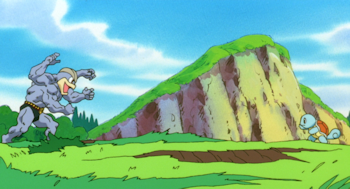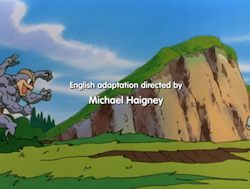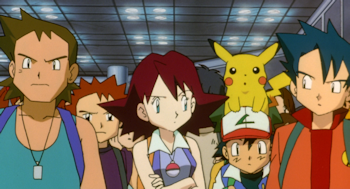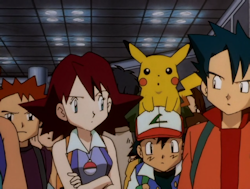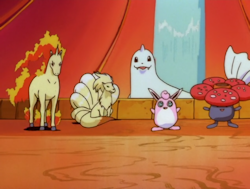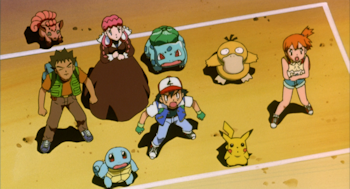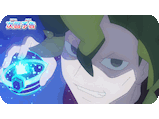
Film 01



Main
Old Updates Archive
Links
 |
Lists |
List of Pokémon
Pokémon World Atlas
List of Techniques
List
of Items
List of TV Episodes
 |
Guides |
Episode
Comparisons
Movies
& Specials Guide
CD Guide
DVD Guide
Voice
Actors Guide
Lyrics Archive
Manga Guide
Video Games
 |
Miscellaneous |
Humor
Pokémon Bashing
Features
Rants
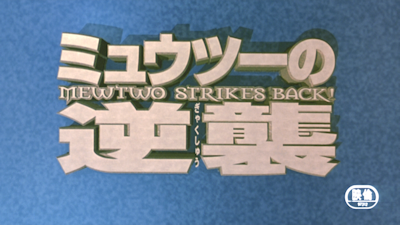
Japanese Movie #1: "Mewtwo Strikes Back!"
American Movie #1: "Pokémon The First Movie "Mewtwo Strikes Back""
Japanese Release Date: July 18th, 1998
American Release Date: November 12th, 1999
Important Characters: "Doctor" (Dr. Fuji), Voyager (Miranda), Umio (Fergus), Sweet (Neesha), Sorao (Corey)
Important Places: New Island (New Island), Pokémon Castle (Mewtwo's Palace), N/A (Old Shore Wharf), Masara Town (Pallet Town)
Mewtwo is an incredibly strong Psychic-Type Pokémon created from cloning the DNA of the Mythical Pokémon Mew. It has trouble coming to terms with the way in which it was brought into the world and is haunted by the question of who is stronger, the Originals or their Copies? To find out, Mewtwo invites a number of strong Trainers, including Satoshi, to gather at its Pokémon Castle on New Island. None of the Pokémon Trainers are able to stand up to Mewtwo or its army of Copies and so the challenger decides that the Originals are indeed inferior. Mewtwo takes everyone's Pokémon and makes its own "superior" Copies, prompting Satoshi to destroy his cloning machine and set all the Pokémon free. The Copies and the Originals meet face-to-face as the one and only Mew itself arrives on the scene! A long battle ensues between the Originals and their Copies, and things escalate to the point where Satoshi tries to stop it all by throwing himself in the middle of Mewtwo's and Mew's attacks! Satoshi is turned to stone as a result but is soon returned to normal thanks to the tears of the Pokémon gathered. Mewtwo, seeing both the Originals and the Copies unite to achieve a single goal, concludes that they're all living creatures and therefore all have a place in this world. Mewtwo leaves the island with its Copies and transports all the other Trainers back to the mainland, their memories of the events of New Island erased.
Thoughts
I recently listened to the audio commentary for Pokémon The First Movie "Mewtwo Strikes Back," the one that was included on the very first DVD release of the film in the United States. In the commentary Norman Grossfeld and Michael Haigney, the two men who wrote the English version of the film, talk about what it was like to create their version of the movie, what challenges they faced along the way, and why they made some of the changes they did. When all is said and done it's a pretty fascinating listen, actually!
But, hearing their side of the story also reveals so, so much about what went wrong with this dub. I'm sure both men have grown and mellowed out considerably since they recorded that commentary track a full quarter of a century ago, but at the time it really seems like 4Kids had nothing but utter contempt for the Japanese original. It appears as though it saw the Japanese original as this poor attempt at making a children's film, a movie with laughably low production values and an amateurish understanding of how to tell a coherent story, but don't worry because 4Kids is here and has the know-how and experience and money needed to "fix" this trainwreck of a movie. The entire commentary is absolutely dripping with condescension whenever the original is brought up, in other words. As someone who thinks the Japanese version is perfectly fine just the way it is, actually, I obviously disagree with this sentiment.
The TV series has a lot of the same localization problems this movie has, sure. But Mewtwo Strikes Back is such an important part of the franchise that its edits, though not as great in number as what you'd find in, say, your typical episode of Pokémon Chronicles, are much more damaging. This isn't a poor dub of a side story about a group of kids protecting a Raikou from Team Rocket, this is a poor dub of one of the most important and influential pieces of media in the entire franchise. When people think "Mewtwo," they think of the Mewtwo from Mewtwo Strikes Back, specifically. If there was ever anything Pokémon-related that needed to be done right, it was Mewtwo Strikes Back, and unfortunately 4Kids' handling of the material was, well...terrible.
The English version of Mewtwo Strikes Back! is an extremely bad dub. Probably around 95% of the film was completely rewritten from the ground up, certain characters are done really dirty by 4Kids, the background music replacements are shockingly bad...I could go on and on. And so, I think I'll do just that! What follows is basically a line-by-line transcripts of both versions of the movie -- the Japanese one and the English one -- that are placed side by side to highlight just how much the movie was changed when it was brought over to the U.S. back in 1999. This write-up is very, very long, and so if you're in a hurry I've also prepared a quick summary here for you to get the overall gist of what was altered.
For everyone else, let's jump right in.
Region One Cropping
So the United States had this problem in the late 1990s / early 2000s where many of the movies released on home video would only ever get "fullscreen" releases. "Fullscreen," back in those days, meant taking a 16:9 video and cropping it down to 4:3 in order to fill up the giant boxy TVs that were the standard at the time. People really hated the idea of black bars on the top and bottom of their screens, you see, and so what film companies would do is they'd simply lop off the left and right sides of the image in order to force a "full"-screen presentation.
Unfortunately, all eight of the 4Kids-era Pokémon movies fell into the "we will only make this movie available in Fullscreen" category of release. And so for about a decade or so the only version of this movie 4Kids sold to fans in the U.S. was one that was cropped to 4:3.
The results of that cropping can be seen below. The original Japanese home video release is on the left while the North American DVD release is on the right. Click on each image to see a larger version.
It wasn't until 2009 -- nearly a full decade after the movie was released! -- that fans in the U.S. could finally purchase this movie in a format that didn't crop out roughly 40% of the image. Thankfully modern day releases of this movie retain its original 16:9 ratio, but for a significant portion of this movie's life that was very much not the case.
Music Edit
The soundtrack to
the English dub of the TV series is a mix of the background music from
the original Japanese version of the show, provided by composer Shinji
Miyazaki, and brand new music created
specifically for the dub. It's not ideal, but some original music being
left intact is
better than none at all, right? Unfortunately when it came to
this movie and the two that follow it, 4Kids decided that no, all that
Japanese music is bad, actually.
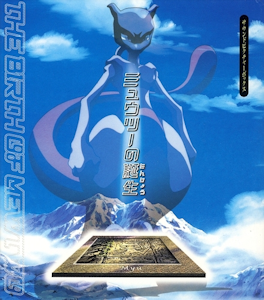
The Japanese music 4Kids replaced in this movie would go on to be used in later episodes of the TV series, and in a lot of those cases 4Kids would actually leave that music as-is. So we know for a fact it had the rights to use the Movie 1 music if it wanted. It just...didn't.
The movie, like the TV series, also has a number of scenes where there isn't any background music playing at all. For the TV series 4Kids almost always removes any breaks in the soundtrack and fills them in with its own compositions, but for this movie the company actually allows some scenes to play out without any music at all. These scenes without music do not occur as frequently in the dub as they do in the Japanese version -- there are still plenty of instances where there's no music in the original but music in the dub -- but at the very least this movie isn't wall-to-wall music like the TV series is.
4Kids' practice of replacing the background music in this movie apparently confused the Japanese producers, who didn't quite understand what in the world the company was doing. According to executive producer Masakazu Kubo, as quoted in the book "Pikachu's Global Adventure: The Rise and Fall of Pokémon":
| Once we actually started looking at the
requests of Warner Brothers, however, it often gave us headaches.
Especially regarding the music, we even checked with them a number of
times whether that was really what they wanted...As opposed to the
Japanese version, which uses a lot of stirring orchestral music, the
U.S. version mainly uses dance and rap music, and there were many
scenes where we thought "Are they seriously going to play such driving
music here?" Some sad scenes would be accompanied by very upbeat
sounds, for instance. But when you listen carefully, you find that the
lyrics actually match the scene. Considering that the soundtrack has
already sold over a million copies on compact disc, I guess what they
did was right for the United States. They replaced the orchestral music
with the kind of songs that American teenagers prefer, and they were
right on the mark. |
Norman J. Grossfeld, president of 4Kids Productions, gives his thoughts on the movie's official website:
| 4Kids Entertainment's Norman Grossfeld,
along with Michael Haigney and John Touhey, dramatically rewrote the
script, incorporating all-new story elements. Grossfeld explains, "Our
first challenge was to rewrite the film and dub the new script over the
footage. We also rescored the entire movie with all new music that
would better reflect what American kids would respond to." The all-new musical score was produced by John Loeffler for Rave Music. Loeffler composed the score with Ralph Schuckett. John Lissauer and Manny Corallo collaborated with Loeffler on the score for the short "Pikachu's Vacation." The soundtrack for "Pokémon The First Movie" will feature a soon-to-be-announced line-up of some of the hottest-selling young recording artists of 1999, including M2M. |
| "The resulting film," continues Grossfeld,
"combines the visual sense of the best Japanese animation with the
musical sensibility of Western pop culture." |
Now this was most certainly more a case of "Hey, if we make our own soundtrack we can then charge royalties for it when our dub gets translated into other languages" than for any artistic reasons (4Kids employees have admitted as much), but the official line, at least at the time, essentially boiled down to "we think our music's better than Shinji Miyazaki's."
Anyway, if you have the means I suggest you pick up the soundtrack to the Japanese version of this movie if you haven't already, though the much-easier-to-find soundtrack to Mewtwo Strikes Back! Evolution will also do in a pinch.
Cut -- 10 minutes 40 seconds
If you're watching the English dub of Mewtwo Strikes Back! via any of the official ways it's been released in the U.S. -- home video, reruns on TV, streaming, etc. -- then the version you're watching is missing the entire first ten minutes of the film. This opening sequence was eventually dubbed and released in the U.S. as a bonus feature on the Mewtwo Returns DVD called "The Uncut Story of Mewtwo's Origin," but as far as I know this sequence has never been added back to the actual movie itself.
 |
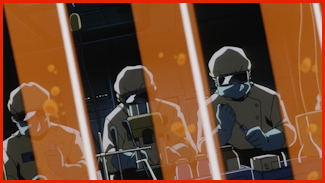 |
 |
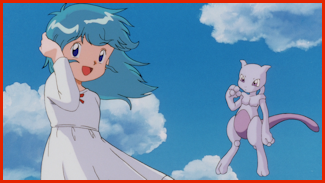 |
 |
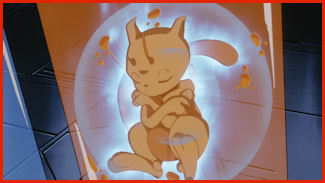 |
"The Uncut Story of Mewtwo's Origin," like the feature film it should have been attached to, also features a heavily rewritten script, music changes, etc. and so I documented all that onto their own separate page here.
Dialogue Edit
As mentioned before, the script for this movie is one of the most unfaithful dub scripts this franchise has ever produced. I'll go into much, much more detail in the comparison that follows, but if you're looking for a quick TLDR summary then here you go:
- The English dub brings
up Giovanni's (and, by extension,
Team Rocket's) role in Mewtwo's creation multiple times throughout the
film while the Japanese version doesn't.
- Mewtwo's character is changed from being a confused creature angry at how it was brought into this world into a much more cartoonish supervillain. It makes snide little side comments and even outright insults the human characters multiple times in the English dub when it doesn't really do this in the Japanese original.
- A "Winds of Water" subplot is added in an attempt to provide an explanation of how the Pokémon tears at the end of the film were able to return Satoshi back to normal. The wording of this dub-only legend also adds fuel to the idea that Ash "dies" at the end of the movie (an idea that is actually false).
- The English dub script
has a significant larger number of jokes, with much of this being
accomplished by adding them
to what are otherwise meant to be
serious scenes.
- Multiple Pokémon
are misidentified, a Nidoqueen is referred to as a "Water-Type," and other attacks and locations from the video
games are left
out of the English dub script.
- A subplot about Mewtwo summoning a giant storm to wipe out humanity is added to the English dub.
- In the Japanese version,
the Originals and the Copies
decide not to use their special attacks, of their own volition, when
fighting each other at the end of the movie. But in the English dub
they're forced into this due to Mewtwo using its psychic
powers to block their attacks.
- A dub original insert
song, "Brother
My Brother," is added during a climatic battle scene in
the English dub to act as a counterpart to the violence occurring
on-screen.
- A "fighting is wrong"
message gets shoehorned into the
English dub that isn't in the original.
- At the end of the
film, Mewtwo in the Japanese version decides that it doesn't matter how
you were born; you're alive either way, and that's all that matters.
The English dub changes this to Mewtwo deciding it doesn't matter how
you were born, it's what you
do with that life afterwards that decides
who you are.
The English dub of the film opens:

| Japanese
(original) |
Japanese
(translated) |
English
Dub |
| (no
dialogue) |
(no
dialogue) |
Narrator: "Life: The great miracle and the great mystery. |
| ミュウツー 「ここはどこだ?私は誰だ?」 | Mewtwo: "Where am I? Who am I?" |
Mewtwo: (whispers) "Who am I~" |
| ミュウツー 「私は記憶にないこの世界をいつも夢見ていた」 | Mewtwo:
"I'm always dreaming of this world I have no memory of." |
Narrator: "Since the beginning, humans and Pokémon alike have searched for its meaning." |
| (Mew darts
across the screen) |
||
| ミュウツー 「ん?お前は誰だ?待ってくれ」 | Mewtwo: "Hm? Who was that?
Wait, come back!" |
Mewtwo: (whispers)
"What...am...I? What am I?" |
| (no dialogue) | (no dialogue) | Narrator: "Many strange and wondrous legends evolved from the pursuit of life's mysteries." |
| (no dialogue) | (no dialogue) | Mewtwo: (whispers)
"(indistinguishable, then) Where am I?" |
| ミュウツー 「私は…」 | Mewtwo: "But I will never be
able
to forget..." |
Narrator: "But none is stranger than this tale of the most powerful Pokémon of all." |
| ミュウツー 「あの誰かが飛び立っていったあの世界を忘れない」 | Mewtwo: "...that world where I
saw that certain someone flying off." |
Mewtwo: (whispers)
"I...am...ready...I am ready...to be...to be...to be..." |
So right off the bat we get to see just how much more talky the English dub is compared to the Japanese version. Something that's only one or two lines in the original will get turned into this big rambling speech for the dub, with the overwhelming majority of this new dialogue not really adding anything to the story at all. Can't see a character's mouth on-screen? Why not give them extra dialogue! It seems like there isn't anybody in the English version of this movie who can go two seconds without rambling on about something or other.
<>
Originally, Mewtwo starts to ask the questions that it's so well known for in Japan: "Who am I? What am I? Who brought me here?" There's no narrator here, no rambling on about the meaning of life, none of that; we're just invited to listen to Mewtwo's inner thoughts. The English dub does include Mewtwo asking its "Who am I?" questions, but it has the Pokémon whisper them in a barely audible voice. And I know this wasn't the intention since this movie came out too early for this to be the case, but I can't help but look back on this part today and think that Mewtwo sounds like he's speaking Parseltongue from the Harry Potter movies. The whole thing's really bizarre.
Mewtwo continues to wonder:

| Japanese
(original) |
Japanese
(translated) |
English
Dub |
| ミュウツー 「ここはどこだ?私は誰なんだ?誰が私をここへ連れてきた」 |
Mewtwo: "Where am I? Who am I?
And who brought me here...?" |
Mewtwo: "Where...am I? This...this is not the same. Was everything before...just a dream? Why...?" |
One of the reasons I suspect "The Uncut Birth of Mewtwo's Origin" was indeed dubbed back in 1999 and intended to be a part of this movie, but then cut later, is because of dialogue like this. The 4Kids rewrite here reads like a leftover from a version of the film that actually did include that ten minute opening, with Mewtwo's "everything before" being a reference to its time with Ambertwo. But since that scene ended up getting cut, Mewtwo's dialogue here is now a reference to the scene American theatergoers actually did get to see, the one of Mew flying off toward a mountain.
The next scene:

| Japanese
(original) |
Japanese
(translated) |
English
Dub |
| ミュウツー 「私は誰だ?なぜここにいる?いや、私はまだここにいるだけだ。私はまだ…世界に
生まれてすらいない」 |
Mewtwo: "Who am I? Why am I
here? No, that's not right...I may be here, but I haven't been born
into this world yet." |
Assistant: "Doctor! Look at this!" |
| Dr. Fuji: "What!?" | ||
| Assistant: "Its brain waves...they're surging." | ||
| Scientist: "Let me see! She's
right." |
||
| Dr. Fuji: "Let's run another scan." | ||
| Assistant: "Its mind is racing!" |
The scientists in the Japanese version have no idea that Mewtwo is about to break free. The ones in the English version, however, are apparently monitoring its activity before it wakes up.
Mewtwo wakes up:
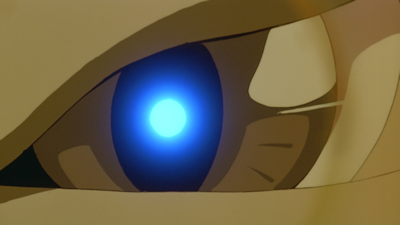
| Japanese
(original) |
Japanese
(translated) |
English
Dub |
| (no dialogue) |
(no dialogue) | Mewtwo: "Those voices..." |
| (no dialogue) | (no dialogue) | Scientist: "I hope we don't
lose this one." |
| (no dialogue) | (no dialogue) | Mewtwo: "They're outside..." |
| (Mew darts
across the screen) |
||
| ミュウツー 「私は誰だ?」 | Mewtwo: "Who am I?" | Scientist: "We can't lose this one!" |
| (no dialogue) | (no
dialogue) |
Mewtwo: "Where I must be...!" |
General rule of thumb about this movie; if there are characters in the English dub talking from off-screen, 99.99% of the time there was no dialogue in the equivalent scene of the Japanese version.
Sound Effect Edit
When Mewtwo breaks free from its test tube, the English dub adds an alarm noise to the background that wasn't there in the Japanese version.
Dialogue Edit
As Mewtwo wakes up:

| Japanese
(original) |
Japanese
(translated) |
English
Dub |
| 研究員 「おお!目覚めたぞ」 |
Researcher: "Oh! It's awake!" |
Assistant: "Radio Giovanni's helicopter! Tell him what's happened!" |
| 研究員 「やつがやったのか?」 |
Researcher: "Did it do all this!?" |
In the Region 1 DVD commentary, Norman Grossfeld and Michael Haigney talk about how they added this line to set up Giovanni's appearance later on in the movie. Except...this doesn't really help do that at all, since Giovanni would have had to have already been airborne and just about to arrive at the island for him to be able to make it there so soon after its destruction. You don't just "radio a helicopter" to some remote island, and then have said helicopter arrive less than two minutes later!
But also, if you're a parent who has no idea what this whole "Pokémon" thing is about but got dragged to the theater anyway, then this line doesn't really help you either since you wouldn't have had any reason to know who in the world this "Giovanni" person is supposed to be in the first place. "Radio Giovanni's helicopter? Why? Is he someone important?"
Dr. Fuji welcomes Mewtwo into the world:
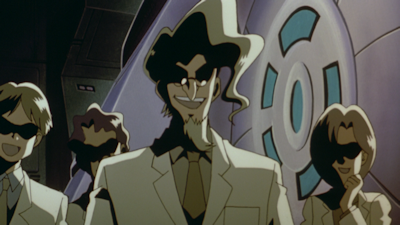
| Japanese
(original) |
Japanese
(translated) |
English
Dub |
| 研究員 「すばらしい」 |
Researcher: "Incredible." |
Dr. Fuji: "Quiet!" |
| 博士 「完成したぞ。ミュウツーが」 |
Doctor: "It's finally ready.
Mewtwo." |
Dr. Fuji: "Let us hear its
psychic powers!" |
| ミュウツー 「ミュウツー?」 |
Mewtwo: "Mewtwo?" |
Mewtwo: "Psychic...powers?" |
| 博士 「お前のことだ。世界で1番珍しいと言われているポケモンから我々はお前
を生み出した」 |
Doctor: "That's your name. We
created you from what's said to be the rarest Pokémon in the
world." |
Dr. Fuji: "For years we
struggled to successfully clone a Pokémon to prove our theories.
But you're the first specimen to survive!" |
I suppose 4Kids wanted to explain that Mewtwo's using its psychic powers to speak and that that's why its mouth doesn't move whenever it has any dialogue. But this explanation isn't really required in the Japanese version, because 1) it's kind of incredibly obvious to anyone who's ever watched any piece of science fiction media, ever, but also 2) a filter's put on Masachika Ichimura's performance to give it that same echo-y effect that's become shorthand for "this is a character's thoughts" in pretty much all of television and film. A helpful little explanation like this is a bit redundant.
Mewtwo finds out where it comes from:
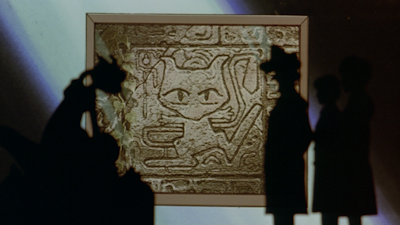
| Japanese
(original) |
Japanese
(translated) |
English
Dub |
| 博士 「そう、あれが世界で1番珍しいと言われるポケモン ミュウだ」 |
Doctor: "That's right, the
Pokémon said to be the rarest in the world is right over
there...its name
is Mew." |
Dr. Fuji: "That is Mew, the rarest of all Pokémon. From its DNA we created you, Mewtwo." |
| ミュウツー 「ミュウ?あれが私の親なのか?父なのか?母なのか?」 |
Mewtwo: "Mew? So is that my
parent? My father? My mother?" |
Mewtwo: "Mew...two? Am I only a copy? Nothing but Mew's shadow? |
| 博士 「とも言えるが…そうとも言えない」 |
Doctor: "In a way, yes...but
in a way, no." |
Dr. Fuji: "You are greater than Mew. Improved through the power of human ingenuity. |
Something else 4Kids likes to do with this movie is move lines around so that information reveals take place earlier, or later, than they do in the Japanese original. In the Japanese version, the doctor tells his creation that its name is "Mewtwo" and then reveals that the Pokémon from which it was copied is named "Mew." The English dub, meanwhile, doesn't have the doctor reveal Mewtwo's name until this scene.
Mewtwo wonders about its future:
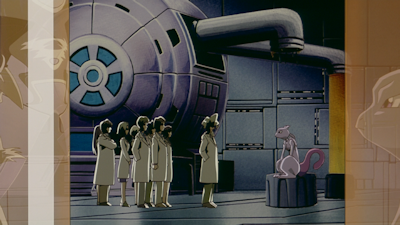
| Japanese
(original) |
Japanese
(translated) |
English
Dub |
| 博士 「お前はミュウを基にしてさらに強く作られた」 |
Doctor: "Mew was used as a
base, but you were made to be even stronger." |
Dr. Fuji: "We used the most advanced techniques to develop your awesome psychic powers!" |
| ミュウツー 「誰が?母でもなく父でもなく。ならば神が?神が私を作ったとでも
言うのか」 |
Mewtwo: "By whom? If it wasn't
by a mother or a father...then was it God? Are you saying God created
me?" |
Mewtwo: "So I am simply the
end result of your experiment. What becomes of me now that your
experiment is over?" |
| 博士 「この世で別の命を作り出せるのは神と人間だけだ」 |
Doctor: "In this world, the
only ones that can create other life are God...and humans." |
Dr. Fuji: "Oh, our experiment
isn't over yet, it's just beginning! Now the serious testing begins!" |
| ミュウツー 「お前たちが?人間がこの私を…」 |
Mewtwo: "So you're saying you
created me? I was created by humans...?" |
Mewtwo: "These humans, they
care nothing for me." |
I get why 4Kids removed the "Mewtwo finds out it wasn't created by God" part of all this, but literally everything else here could have been left as-is without any problems whatsoever.
The scientists talk amongst themselves:

| Japanese
(original) |
Japanese
(translated) |
English
Dub |
| 研究員 「まさに科学の勝利」 |
Researcher: "This is a true
triumph of science!" |
Dr. Fuji: "Congratulations." |
| 研究員 「これで私たちの正しさが照明されたんですね」 |
Researcher: "This proves what
we were saying was right, doesn't it?" |
Researcher: "...sure to increase our funding now~." |
| Dr. Fuji: "We've done it! Excellent job!" | ||
| 研究員 「研究が続けられるぞ」 | Researcher: "We'll be able to continue our research!" | Researcher: "We can get
started on Mewthree!" |
| 研究員 「ここが新たなる聖地となったのだ」 | Researcher: "This lab has just become a new mecca." | Researcher: "We've got to find a way to (inaudible)." |
| 研究員 「研究費が増えるに違いない」 |
Researcher: "Our research
budget is sure to go up!" |
Researcher: "...mutations..." |
| Researcher: "Is the new tank ready?" | ||
| 研究員 「次のステップにバージョンアップだ」 | Researcher: "Our next step will be to make an upgraded version." | Researcher: "No...we'll have to come up with a cage for it." |
| 研究員 「他のセクションにも連絡を取ります」 | Researcher: "I'll contact the other departments." | |
| 研究員 「おめでとう」 | Researcher: "Congratulations." | Researcher: "Congratulations.." |
| 研究員 「新しいポケモンの誕生だ」 | Researcher: "This is the birth of a new Pokémon." | Researcher: "It won't be long..." |
研究員 「マスコミ対策は大丈夫ですか?」 |
Researcher: "Are we going to be able to handle the media?" |
Researcher: "...down to a science!" |
| Researcher: "...wait until the
TV reporters..." |
||
| Researcher: "Excellent! We'll start our testing right away." |
As you can see, the overwhelming majority of this is completely different between versions. There are a few similarities -- both have researchers talk about increased funding, upgrades (though the Japanese version never uses the phrase "Mewthree"), and the media -- but a lot more of this gets changed than gets kept as-is.
What strikes me about this round of rewrites is how hard the English dub is working to tell us just how evil these humans are. We're about to see all of them die in just a few minutes, and so I suppose 4Kids thought it would be best to add in some lines that suggest they're going to start performing tortuous experiments on Mewtwo to help soften the blow of their untimely demises. Yes, the titular Pokémon murders around a dozen humans, but they're all super evil so it's fine!
As Mewtwo looks at the flaming wreckage of Dr. Fuji's lab:

| Japanese
(original) |
Japanese
(translated) |
English
Dub |
| ミュウツー 「私は誰だ?ここはどこなんだ?私は何のために生まれたんだ」 |
Mewtwo: "Who am I? What is
this place? And why was I even born!?" |
Mewtwo: "Is that my purpose?
Am I just an experiment...a laboratory specimen? This cannot be...my
destiny!" |
Mewtwo going back to the questions of its own existence get changed to it questioning its future.
After this, Mewtwo starts blowing up the lab. Dr. Fuji's last words are actually fairly faithfully translated, all things considered, making them the first piece of dialogue in this movie to actually be somewhat translated. It's kind of wild it's taken us this long to get to this point.
Mewtwo surveys the destruction it just caused:

| Japanese
(original) |
Japanese
(translated) |
English
Dub |
| ミュウツー 「これが私の力?私がこの世で1番強いポケモン。ミュウ、お前より
強いのか?」 |
Mewtwo: "Is this my power? I
am the strongest Pokémon in the world...Mew, am I even stronger
than you?" |
Mewtwo: "Behold my powers! I am the strongest Pokémon in the world. Stronger even than Mew!" |
Another one of the big lies the dub tells us is that Mewtwo is this cocky supervillain who thinks it's awesome. It's actually the opposite that's true.
Originally, Mewtwo asks if it's the strongest Pokémon, and then asks if it's even stronger than Mew. This uncertainty of its standing in the world is kind of what drives a lot of this movie and so I don't really know why 4Kids thought it was OK to change it.
Giovanni arrives on the scene:
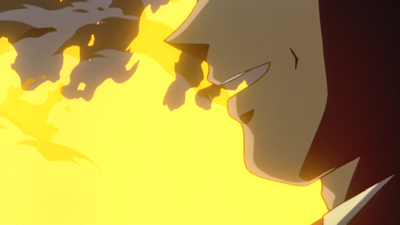
| Japanese
(original) |
Japanese
(translated) |
English
Dub |
| サカキ 「お前は確かに世界一強いポケモンかもしれない。だがこの世界にはもう
1つ強いものがいる」 |
Sakaki: "You may indeed be the
strongest Pokémon in the world. But there is something else in
this world that's also strong." |
Giovanni: "Those fools thought you were a science experiment. But I...I see you as a valuable partner." |
| ミュウツー 「人間?」 |
Mewtwo: "You mean humans?" |
Mewtwo: "Partner?" |
| サカキ (うなずく) |
Sakaki: (nods) |
Giovanni: (nods) |
A perfectly fine conversation gets completely rewritten, just because.
Giovanni makes a proposition:
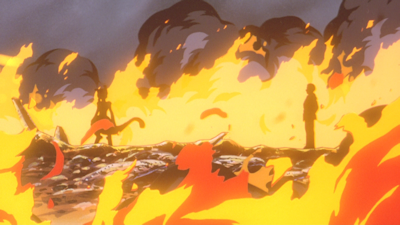
| Japanese
(original) |
Japanese
(translated) |
English
Dub |
| サカキ 「人間とお前が力を合わせれば世界は我々のものだ」 |
Sakaki: "If you combine your
power with that of us humans, the world can be ours." |
Giovanni: "With your psychic
powers and my resources, together we can control the world!" |
| ミュウツー 「世界が我々のもの?」 |
Mewtwo: "Ours?" |
Mewtwo: "I do not need your
help for that, human!" |
| サカキ 「ただしお前のその力を野放しにすれば世界は滅びるだけだ。お前は力を
制御しなければなるまい」 |
Sakaki: "However, letting your
powers go unchecked will only bring about destruction for us all. You
need to find a way to control that power." |
Giovanni: "A wildfire destroys
everything in its path. It will be the same with your powers unless you
learn to control them. I can help you do that." |
| ミュウツー 「制御?」 |
Mewtwo: "Control it?" |
Mewtwo: "How?" |
| サカキ 「力に任せて。世界中をこの島のように焼き尽くしていいのか?」 |
Sakaki: "Leave that up to me.
Or would you like to see the
rest of the world burn, just like this
island?" |
Giovanni: "Trust me, and
I'll show you a way to focus your powers that will make you invincible." |
| ミュウツー 「どうすればいいのだ?」 |
Mewtwo: "What should I do?" |
Mewtwo: "Show me." |
| サカキ 「フッ」 |
Sakaki: "Heh." |
Giovanni: "Heh heh heh." |
This is a great showcase of the differences in the way Mewtwo's character is written in the Japanese version versus how it's written in the English dub. In the original Mewtwo is listening to Sakaki with an open mind, willing to go along with whatever he says because, at this moment at least, it has no reason not to. In the English dub, however, Mewtwo is noticeably more defensive and stand-offish. Mewtwo makes it clear it does not trust this human at all while, at the same time, being a lot more cocky than its Japanese counterpart. 4Kids will continue to tweak the character like this throughout the rest of the movie.
Mewtwo gets some new clothes:
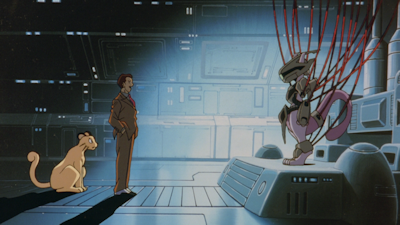
| Japanese
(original) |
Japanese
(translated) |
English
Dub |
| ミュウツー 「我が身を守る鎧で私の力を押さえつける。こんな私にお前は何をさ
せようというのだ」 |
Mewtwo: "This armor protects
my
body but suppresses my powers. Just what is it you intend to have me
do?" |
Mewtwo: "You say this armor protects my body, yet it suppresses my powers." |
| サカキ 「簡単なことだ。この星で誰もがやってきたことをやればいい」 |
Sakaki: "That's simple. The
same thing everyone else on this planet does." |
Giovanni: "Your powers are not being suppressed, they're being focused. Learn to use them to accomplish your purpose." |
| ミュウツー 「誰も?」 |
Mewtwo: "Which is?" |
Mewtwo: "What is that?" |
| サカキ 「戦いと破壊と略奪。強いものが勝つ」 |
Sakaki: "Fight. Destroy.
Plunder. It's survival of the fittest out there." |
Giovanni: "Patience, my
friend...your purpose will become clear." |
The English dub is a lot more ambiguous here than the Japanese version, which is weirdly out-of-character for 4Kids considering how the rest of the movie gets rewritten.
During the "Mewtwo works for Team Rocket" montage:
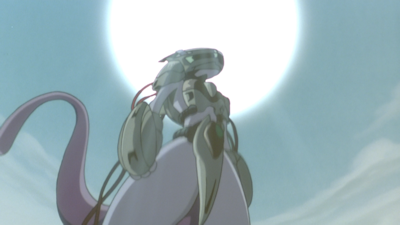
| Japanese
(original) |
Japanese
(translated) |
English
Dub |
| ミュウツー 「しかし私は誰だ?」 |
Mewtwo: "But who am I?" |
Mewtwo:
"So...this is my power?" |
| (Mewtwo helps
with rounding up a bunch of bull Pokémon) |
||
| ミュウツー 「私はどこにいる?」 |
Mewtwo: "Where am I?" |
Mewtwo: "I am in control now!" |
| (Mewtwo defeats
the rival's Pokémon) |
||
| ミュウツー 「私は何のために戦っている?」 |
Mewtwo: "And what am I
fighting for?" |
Mewtwo: "But why am I here?" |
So let me get this straight; earlier in the movie 4Kids had it so Mewtwo is very cocky and sure that it's the most powerful Pokémon in the world, and yet during this montage it's suddenly surprised at how strong it is...?
Originally Mewtwo goes back to the questions that have been plaguing it since it was born.
Back at the Team Rocket headquarters:
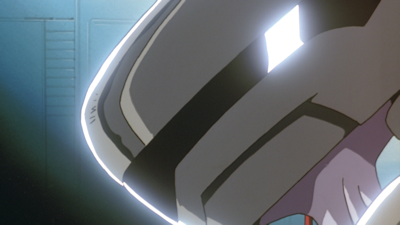
| Japanese
(original) |
Japanese
(translated) |
English
Dub |
| ミュウ
ツー 「私は何のために生きている」 |
Mewtwo: "Why am I alive?" |
Mewtwo: "Now I fully perceive my power. But...what is my purpose?" |
| サカキ 「お前はポケモンだ。ポケモンは人間のために使われ人間のために生き
る」 |
Sakaki: "You're a
Pokémon. Pokémon are to be used by humans, to live for
humans." |
Giovanni: "To serve your master. You were created to fight for me. That is your purpose." |
The "now I fully perceive my power" part is dub-only. Giovanni also tells Mewtwo that it was created to fight for him, something Sakaki doesn't divulge in the Japanese version.
The two continue to talk about Mewtwo's value:

| Japanese
(original) |
Japanese
(translated) |
English
Dub |
| ミュウツー 「お前のために戦えと言うのか。この私に人間のために戦えと言うの
か」 |
Mewtwo: "So you're saying to
get out there and fight for you? To fight for you humans?" |
Mewtwo: "That cannot be! You
said we were partners! We stood as equals!" |
| サカキ 「お前は人間に作られたポケモンだ。他に何の価値がある?」 |
Sakaki: "You're a
Pokémon created by humans. What other value could you possibly
have?" |
Giovanni: "You were created by
humans to obey humans. You could never be our equal." |
| ミュウツー 「私の価値か?私は誰だ。私は何のために生きている」 |
Mewtwo: "My value? Who am I?
Why am I alive?" |
Mewtwo: "Humans may have
created me...but they will never enslave me! This cannot be my destiny!" |
But...the humans literally did enslave you, dub Mewtwo. That's actually what that whole entire last montage was all about!
Mewtwo breaks free:
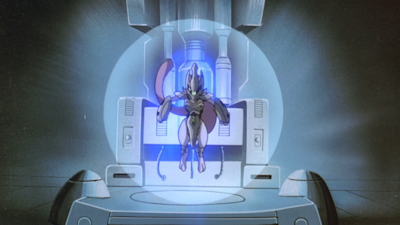
| Japanese
(original) |
Japanese
(translated) |
English
Dub |
| サカキ 「何をする?」 |
Sakaki: "What are you doing?" |
Giovanni: "Stop this now!" |
| ミュウツー 「私は人間に作られた。だが人間でもない。作られたポケモンの私は
ポケモンですらない。」 |
Mewtwo: "I was created by
humans, but I am not one of them. I was created to be a Pokémon,
but I'm not one of them, either." |
Mewtwo: "I was not born a
Pokémon. I was created. And my creators have used and betrayed
me. So...I stand alone!" |
The original Mewtwo is upset by not knowing where exactly it fits in this world while dub Mewtwo seems more upset about being betrayed than anything else.
After Mewtwo escapes he returns to New Island:

| Japanese
(original) |
Japanese
(translated) |
English
Dub |
| ミュウツー 「私は誰だ?ここはどこだ?誰が生めと頼んだ?誰が作ってくれと
願った?私は私を生んだすべてを恨む」 |
Mewtwo: "Who am I? Where am I?
Who asked for me to be born? Who wished for me to be created? I abhor
everyone and everything that brought me into this world. " |
Mewtwo: "Who am I? What is my true reason for being? I will find my own purpose...and purge this planet of all who oppose me, human and Pokémon alike." |
The "purge this planet of all who oppose me" part is dub-only. The original Mewtwo is upset, sure, but it doesn't venture into the same genocidal territory dub Mewtwo does.
Mewtwo continues:

| Japanese
(original) |
Japanese
(translated) |
English
Dub |
| ミュウツー 「だからこれは攻撃でもなく宣戦布 告でもなく。私を生んでだお前たちへの逆襲だ」 | Mewtwo: "This is neither an attack nor a declaration of war. No...to those of you who gave birth to me I will...strike back." | Mewtwo: "The world will heed my warning: the reign of Mewtwo will soon begin." |
The ending of this in the Japanese version, where Mewtwo works the title of the movie into the end of its speech here, is one of the more quoted lines from this movie among Japanese fans. The English line, on the other hand, is just this really clichéd evil villain line.
I guess this is as good a time as any to bring up Philip Bartlett's Mewtwo voice. If I ignore how absolutely perfect Masachika Ichimura's performance is for a second and judge Mr. Bartlett on his own merits, I'd say that it's a good voice in and of itself but oh my God does he give one hammy performance. He overacts pretty much every single one of his lines and makes Mewtwo sound more like a parody villain you'd see on The Simpsons than the genuinely tortured character it's supposed to be. If you haven't had a chance to listen to Masachika Ichimura's quiet, thoughtful performance then please, do yourself a favor and check out the Japanese version of this movie (or the 2019 remake) ASAP.
Side Note, Cut -- 7 seconds
The title screen is completely different between the two movies. The English title screen sequence is also about seven seconds shorter than the Japanese one.
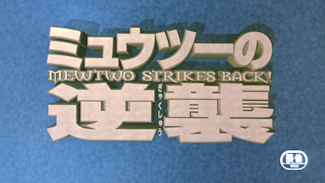 |
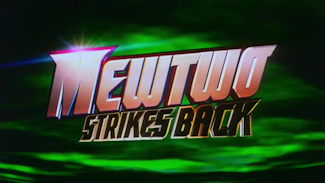 |
I'd like to point out that the Japanese logo also has the movie's title written out in English, right in the center of the screen there, and yet it got replaced anyway. Changing just about every other movie's title screen I get since so many of them get renamed for North America, but this one? What's the point?
Dialogue Edit
The narrator introduces us to the movie's good guys:
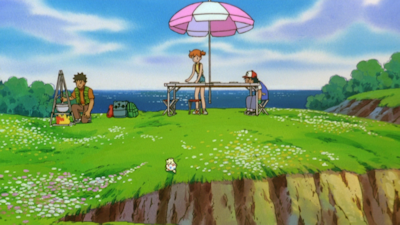
| Japanese
(original) |
Japanese
(translated) |
English
Dub |
| (カ
スミの鼻歌) |
(Kasumi
hums) |
Narrator: "Today Ash, Brock,
and Misty are taking a short break from their Pokémon
adventures. As always, Ash is determined to become a Pokémon
Master. And as always,
he's ready to endure any hardship, bear any burden, with strength,
stamina, and a will of steel!" |
| ナレーション 「ポケモンマスターを目指し修行の旅を続けるサトシたち一行。天
気もいいしちょっと野原で一休み」 |
Narrator: "The group of
Satoshi and his friends are continuing their journey to train to become
a Pokémon Master. We join them as they take a short break in a
field on
this beautiful day." |
The English dub's narration is way, way too wordy. Having said that, I don't mind the change 4Kids made at the very beginning where the narrator refers to all three children by name (Ash, Brock, and Misty) instead of the more generic "Satoshi and his friends" from the Japanese version. In Japan this would have been seen as just like any other movie based on a popular TV series, where the expectation is that you're already be familiar with who everyone is before you even set foot in the theater, but in the U.S. this film would have been a lot of parents' first time actually sitting down and watching anything with "Pokémon" in its name and so 4Kids gives them some additional introductions.
Ash is hungry:
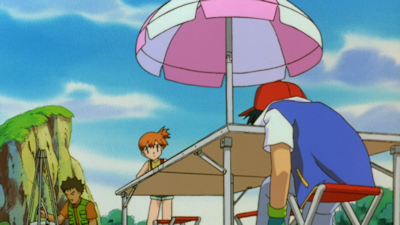
| Japanese
(original) |
Japanese
(translated) |
English
Dub |
| サトシ 「タケシ~!まだ?」 |
Satoshi: "Takeshi~! Isn't it
ready yet?" |
Ash: "Hungry...need food." |
| カスミ 「サトシ!あんたも手伝いなさいよ」 |
Kasumi: "Oh Satoshi! get in
there and help him!" |
Misty: "Oh Ash! You haven't
done a thing all day!" |
| サトシ 「ダメ。もう腹減って1ミリも動けない」 |
Satoshi: "I can't. I'm so
hungry I can't move even one millimeter." |
Ash: "I'm too weak to work,
Misty. I haven't eaten since breakfast." |
| カスミ 「もう~」 |
Kasumi: "Seriously?" |
Misty: "Oh~!" |
| タケシ 「じっくり煮込んでゆっくり育てる。スープもポケモンも慌てちゃいけな
い」 |
Takeshi: "Slowly simmer and
slowly grow up. Whether it's soup or Pokémon, you can't rush
these things." |
Brock: "This lunch is gonna be
just perfect for you Ash. It's my lazy boy "no-chew" stew." |
Dialogue like this is basically what counts as "faithful" in this movie. The overall vibe is still there, I guess, but each line is still a complete rewrite.
I'm also slightly amused at Brock calling this his "lazy boy no-chew stew" when you can clearly see large chunks of carrots and green peppers floating on the top there. Is he trying to make Ash choke to death or something!?

The pirate-like Trainer makes his appearance:

| Japanese
(original) |
Japanese
(translated) |
English
Dub |
| 海賊風トレーナー 「ヘイ!そこのボーイ!ユーがバッジ8個ゲットしたマサラタ
ウンのサトシ、その人かな?」 |
Pirate-like Trainer: "Hey,
little boy! Are you the Satoshi from Masara Town who got eight badges?" |
Pirate-like Trainer: "Hey! You there! I'm looking for a Pokémon Trainer named Ash from Pallet Town. Ya know 'im?" |
| サトシ 「そうだけど」 |
Satoshi: "That's me. Why do
you ask?" |
Ash: "Yeah, he's me." |
| 海賊風トレーナー 「ポケモンバトルできるかな」 | Pirate-like Trainer: "Can you
do a Pokémon battle?" |
Pirate-like Trainer: "Let's
have a match...unless you're afraid to lose!" |
| サトシ 「オーケー売られた勝負は買うっきゃない」 |
Satoshi: "Sure! If someone
challenges me I have to accept!" |
Ash: "I'm afraid you're gonna lose this one!" |
In his first line, the pirate-like Trainer mentions Satoshi having eight badges, making it super clear this movie takes place after the events of Episode 063 "Tokiwa Gym! The Final Badge!" The English dub omits this reference.
The pirate-like Trainer's second line in the Japanese version, Pokémon batoru dekiru ka na?, seems to be a reference to a bunch of other Pokémon songs his voice actor's done for the franchise. His voice actor in the original, an entertainer named Raymond Johnson, contributed to songs like Pokémon Kakeru ka na? ("Can You Draw All the Pokémon?") and Pokémon Ieru ka na? ("Can You Name All the Pokémon?"), and so his Pokémon batoru dekiru ka na? line here can be seen as an homage to that. None of those songs were ever released in the U.S., obviously, and so this reference got removed.
Ash gets ready to battle:

| Japanese
(original) |
Japanese
(translated) |
English
Dub |
| カスミ 「1ミリも動けないんじゃなかったの」 |
Kasumi: "What happened to not
being able to move even one millimeter?" |
Misty: "Ash! You just said you
were too weak to work!" |
| サトシ 「ポケモンバトルの1つや2つは朝飯前さ」 |
Satoshi: "It's fine! I can
knock out a Pokémon battle or two before breakfast, no problem!" |
Ash: "That's right, I am too
weak to work. But a Pokémon battle isn't work!" |
| タケシ 「ところでこれはランチ…昼飯前だねえ」 |
Takeshi: "It's lunchtime, by
the way...so a battle or two before lunch, right?" |
Brock: "That's progress...at
least his mouth is working." |
The jokes between versions are different but otherwise this is fairly OK-ish.
Music Edit
In the Japanese version the opening theme to this movie is Mezase Pokémon Master '98, a remixed version of the opening theme ot the TV show.
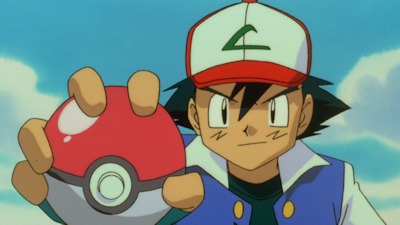
The English dub replaces this with a remix of Pokémon Theme, which is the appropriate thing to do, I guess. It's certainly preferable to using any of the other songs on the English dub's soundtrack, that's for sure!
Dialogue Edit
Ash wins his first match:

| Japanese
(original) |
Japanese
(translated) |
English
Dub |
| (no
dialogue) |
(no
dialogue) |
Ash: "Great job, Bulbasaur!
You did it!" |
During the opening theme, when Satoshi's Pokémon win, you can see his mouth move but can't actually hear what he's saying. Which, you know, for an opening theme montage is actually perfectly normal! The dub, however, gives Ash some filler dialogue here so he's not moving his mouth in silence.
Video Edit
This one's
strange.
In the North American home video release of the English dub, we see
Machamp come out of its
Poké Ball in the opening,
and then we see the exact same footage played a second time. But
in the original version, we only
see
Kairiky come out of its Monster Ball once. So I'm thinking
"Well, maybe this footage was repeated to make the video long enough to
fit the new song." But
then
in the very next scene, a series of cuts are made -- the shot of Ash throwing the
Poké Ball, the
shot
of the Poké
Ball
in the air spitting
Squirtle out, and the shot of
Squirtle
landing on the ground -- to bring the runtime back down to what it
would have been anyway.
So a few seconds
got added to
the opening by repeating the animation of Machamp coming out, but then
a few seconds of Squirtle coming out also
get removed? It
couldn't
have made done any of this to lengthen the song, because this change
took away
as much footage as it added, so there's literally nothing gained from
them doing any of this.
The
HD release of
this movie has reportedly fixed this issue and so this isn't really a
thing anymore, but it's still a weird issue that existed for the
home video releases of the English dub for the first ten years of
existence or so.
The pirate-like Trainer loses:

| Japanese
(original) |
Japanese
(translated) |
English
Dub |
| 海賊風トレーナー 「オーマイガー」 |
Pirate-like Trainer: "Oh my
God!" |
Pirate-like Trainer: "Oh
nooooo~!" |
Everyone knows about this change but I'll mention it here anyway; in the original the Pirate-like Trainers says "Oh my God," in English.
Misty and Brock reflect on the battle they just witnessed:
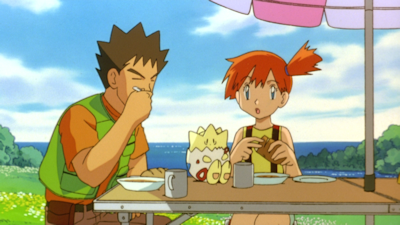
| Japanese
(original) |
Japanese
(translated) |
English
Dub |
| カスミ 「相手が弱かっただけ」 |
Kasumi: "He only won because
his opponent was so weak." |
Misty: "Well that sure was a
shocking ending." |
| タケシ 「育てがたりなかったんだな」 |
Takeshi: "I guess that guy
didn't
raise his Pokémon enough." |
Brock: "Shocking that Ash
moved so fast." |
| トゲピー 「ピイ」 |
Togepy: "Pii" |
Togepi: "Pii" |
The idea of insulting Satoshi is present in both versions, though the actual insults themselves are quite different.
The Rocket trio makes its debut:

| Japanese
(original) |
Japanese
(translated) |
English
Dub |
| コジロウ 「ピカチュウますます磨きがかかってる」 |
Kojirou: "That Pikachu...the
more I see it the more I want it!" |
James: "There's another credit
on Pikachu's "charge" account!" |
| ムサシ 「美しい」 |
Musashi: "Isn't it beautiful." |
Jessie: "We've got to grab it!" |
| ニャース 「ただの1度も勝てなかったニャ―たち。しかしニャ―たちの辞書には
諦めという言葉はニャース」 |
Nyarth: "Too bad the three of
us have nyever beaten it before. But that doesn't matter! The word
"quit" isn't in any of our dictionaries, right Nya?" |
Meowth: "I know we gotta grab
some rare Pokémon for the Boss but it wouldn't be such a bad
idea if we grabbed a little bite to eat, would it?" |
| ムサシ 「必ずやあのピカチュウを…」 |
Musashi: "We'll definitely get
that Pikachu..." |
Jessie: "We didn't come here
to steal a meal!" |
It's hard to tell who the English dub is being written for sometimes. Earlier scenes added a extra expository information to help newbies to the franchise understand who these characters are, but then you also have scenes like this one, where the original dialogue is designed specifically to introduce these antagonists to any newcomers while the English dub just comes off as gibberish to anyone who isn't already really familiar with who Jessie, James, and Meowth are.
The trio's hungry:

| Japanese
(original) |
Japanese
(translated) |
English
Dub |
| コジロウ 「ああでもさ あれ見てよ」 |
Kojirou: "Ah, but look at
that..." |
James: "I'd settle for a taste
of that Pika-chow." |
| ニャース 「腹減ったニャ」 |
Nyarth: "I'm starving Nya." |
Meowth: "I'm starvin'." |
| ムサシ 「フライパンはあるわよ」 |
Musashi: "Well I have a frying
pan." |
Jessie: "I can cook something." |
| ニャース 「そんなものお肉も野菜もなければただの鉄板ニャ」 |
Nyarth: "But without meat or
vegetables that's just a useless slab of iron." |
Meowth: "Thanks, but the last time you cooked you wiped out eight of my nine lives." |
Haha, it's funny because Jessie apparently murdered her friend eight times in a row!
Our heroes check their Princess Leia hologram:

| Japanese
(original) |
Japanese
(translated) |
English
Dub |
| ジョーイ 「あなたたちを前途有望なポケモントレーナーと見込んで最強のポケモ
ントレーナーであるご主人様のパーティーにご招待します。場所はニューアイランド・ポケモン城。おいでになるかならないか返信用はがきにチェックをお願い
します。最強のポケモントレーナーの招きをぜひお受けください」 |
Joy: "We have determined you
all are promising Pokémon Trainers and therefore invite you to a
party being held by my master, the world's strongest Pokémon
Trainer. The party will take place at Pokémon Castle on New
Island.
Please use the postcard attached to inform us whether or not we should
expect
you. We hope you will accept this invitation from the world's strongest
Pokémon Trainer." |
Nurse Joy: "You have been
chosen to join a select group of Pokémon Trainers at a special
gathering. It will be hosted by my master, the world's greatest
Pokémon Trainer, at his palace on New Island. A chartered ferry
will leave from Old Shore Wharf to take you to the island this
afternoon. Only Trainers who present this invitation will be admitted.
If you decide to attend, you must reply at once. My master awaits you." |
This is mostly fine, especially for this movie, but there are still a few differences worth pointing out. Originally, Joy tells our heroes that the name of her master's castle is "Pokémon Castle" (ポケモン 城), something the dub neglects to mention. On the flip side, the dub decides to assign a name to the port where they'll meet Miranda ("Old Shore Wharf") while that same port doesn't have a name in the Japanese version. The dub also states that a "chartered ferry" is taking off "this afternoon," which, again, isn't in the Japanese version.
This exchange also shows one of the tricky issues with English dubbing -- you're able to get away with leaving out gender-revealing pronouns in Japanese because of how that language is structured, but it's really, really hard to do the same thing in English without it sounding super stilted and awkward. In this instance, the English scriptwriters had to end up using a gender revealing pronoun ("he") to refer to the owner of the palace on New Island, which has the unfortunate side effect of more or less assigning Mewtwo a gender. Which isn't a huge deal since I think most of us see this Mewtwo as a male anyway, especially after the Genosect movie, but still.
Miranda speaks at "Old Shore Wharf."

| Japanese
(original) |
Japanese
(translated) |
English
Dub |
| ジュンサー 「皆さんお静かに。この方がこの波止場を仕切っている…」 |
Junsar: "Everyone, quiet down!
This person here is the manager of this harbor..." |
Officer Jenny: "It’s more than
just rain! The harbor manager thinks this could be the worst storm
ever!" |
| ボイジャー 「…ボイジャーです。海を知りたきゃ波止場のカモメに聞いてみな。
聞くまでもない。雲の流れをご覧なさい。こんなハリケーン見たことがありません」 |
Voyager: "Voyager's the name.
They say if you want to know more about the sea you just need to ask
the seagulls near the
harbor. But even that won't be necessary this time. Because just look
at the way
the
clouds
are moving out there. I've never seen a hurricane quite like this." |
Miranda:
"Listen to me! The prophets have predicted the return of the Winds of
Water. For years I have prayed that mankind would never witness...that
deadly storm ever again." |
| ジュンサー 「そんなにすごいんですか?」 |
Junsar: "Is it really that
bad?" |
Officer Jenny: "Isn't that
just a legend?" |
| ボイジャー 「港育ちの私が今まで経験したことのない嵐です。しかもその嵐はこ
の沖合ニューアイランドの上空にある皆さんを危険な目に遭わせるわけにはまいりません。それがこの港を守る私の願い」 |
Voyager: "I grew up by the
harbors and have never seen a storm quite like this. And it seems
to be centered over New Island and so I can't allow you to put yourself
in
such danger. Please, stay here for me, the protector of this port." |
Miranda: "The ancient writings
tell of the storm wiping out all but a few Pokémon. In their
sorrow, the water of their tears somehow restored the lives lost in the
storm. But there are no Pokémon tears today. Just waters which
no one can survive." |
You probably know about this already, but this whole "Winds of Water" legend (which I guess is the same "bedtime story" Dr. Fuji told his daughter, maybe?) doesn't exist in the Japanese version. Instead, Voyager tells the Trainers gathered there that in all the years she's lived there, this is the worst hurricane she's ever seen.
Voyager also tells us her name in the Japanese version while Miranda does not.
Fergus speaks up:
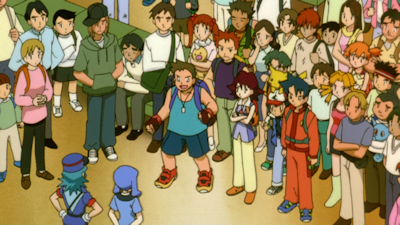
| Japanese
(original) |
Japanese
(translated) |
English
Dub |
| ウミオ 「大丈夫さ、俺のポケモンなら。俺のポケモンは水に強い。こんな海渡っ
てみせるさ」 |
Umio: "My Pokémon will
be fine! They're strong in the water, after all. Just watch me -- I'll
cross this ocean no problem!" |
Fergus: "Well I'm going to New Island anyway. All my Pokémon are Water-Types. We'll just swim over to that palace" |
As we'll see later in this movie, what Fergus is saying here is simply not true; his Nidoqueen is very much not a Water-Type.
Officer Jenny adds another warning:
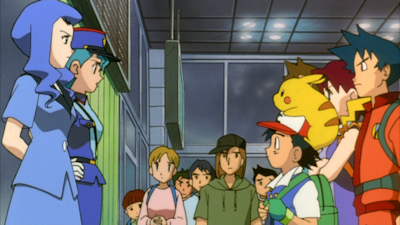
| Japanese
(original) |
Japanese
(translated) |
English
Dub |
| ジュンサー 「そうよ!それに今ポケモンがケガをしたらポケモンセンターで治療
することもできないのよ」 |
Junsar: "That's right! And on
top
of that, if your Pokémon were to get hurt you wouldn't be able
to get them treated at the Pokémon Center." |
Officer Jenny: "And besides, if you tried that stunt and your Pokémon got hurt, you'd be out of luck because we had to close down the Pokémon Center." |
| サトシ 「どういうこと?」 |
Satoshi: "How come?" |
Ash: "How come?" |
| ジュンサー 「ポケモンセンターのジョーイさんが行方不明なんです。ジョーイさ
んがいなければポケモンの治療はできません。そこのポスターが捜索願です」 |
Junsar: "The Joy-san at the
Pokémon Center's gone missing. And without her there's nobody to
treat your Pokémon. There's a missing person's poster over
there." |
Officer Jenny: "Because the nurse in charge of the Center disappeared last month. And if any of you see her please contact me at once. That's a picture of her over there on the wall." |
Officer Jenny says that Joy disappeared "last month," but the Japanese version doesn't give us a timeframe for this.
Officer Jenny and Miranda watch as the Trainers leave for New Island:

| Japanese
(original) |
Japanese
(translated) |
English
Dub |
| ボイジャー 「やっぱり止めてムダね」 |
Voyager: "I knew we couldn't
stop them." |
Miranda: "Some Trainers have
no fear." |
| ジュンサー 「えっ」 |
Junsar: "Hm?" |
Officer Jenny: "Hm?" |
| ボイジャー 「あの子たちはポケモントレーナー、冒険者たち。止めてやめるよう
な子ならここに集まってはこない」 |
Voyager: "Those children are
Pokémon Trainers. Adventurers. They never would have come here
in the first place if they were the kind to quit when told to stop." |
Miranda: "To them, this is
just one more challenge. They follow their hearts. That is what sets
them apart and will make them Pokémon Masters." |
Miranda randomly starts talking about what it takes to be a Pokémon Master, something her Japanese counterpart doesn't touch upon at all.
The two continue to see them off:
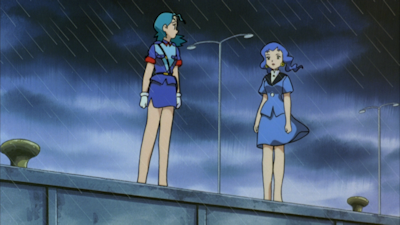
| Japanese
(original) |
Japanese
(translated) |
English
Dub |
| ボイジャー 「無事を祈りましょう」 |
Voyager: "Let us pray for
their safety." |
Miranda: "Good luck to all of
you." |
My initial reaction is that this was changed because of the vague religious undertones present in the word "pray" but then this movie used that very same word not five minutes before ("For years I have prayed that mankind would never witness...that deadly storm ever again") so this might just be a random change for the sake of random change.
Ash runs to the edge of the pier:
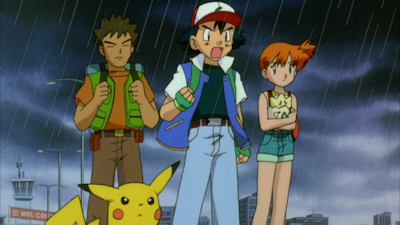
| Japanese
(original) |
Japanese
(translated) |
English
Dub |
| サトシ 「この海の向こうに最強のトレーナーがいるんだ。このまま引き下がるわ
けにはいかないぜ」 |
Satoshi: "The world's
strongest Trainer is on the other side of this ocean. There's no way I
can back out now." |
Ash: "The world's greatest Pokémon Master is waiting for me. Let's use our Pokémon to get to that island!" |
Satoshi never refers to Mewtwo as a "Pokémon Master," that's all on 4Kids. He also isn't naïve enough to ever believe his current team of Pokémon is strong enough to make it past the storm.
The Rocket trio shows up in disguise:

| Japanese
(original) |
Japanese
(translated) |
English
Dub |
| ムサシ 「お困りのようだね。どうだい?タダとは言わないがことと次第によっ
ちゃあ船を出してやってもいいぜ」 |
Musashi: "You look like you
could use a hand. How about a ride? I'm not saying we'll do it for free
or
anything, but depending on how things go we might be willing to send
this boat out for you." |
Jessie: "You vant to cross
maybe? Ve take you ya? Ve Vikings are used to big vave. Ve get you to
New Island faster than you can say fahrvergnügen." |
The Japanese version has the Rocket trio dressed like Vikings but that's just about all they do with the concept. No extra accents, no extra "flavorful" jargon, none of that. In fact, the word "Viking" (or any of the Japanese equivalents) is never said in the Japanese version, not even once! The English dub, meanwhile, decides this whole aesthetic simply cannot go by uncommented on and so they have Jessie put on a stereotypical "Scandinavian" accent (which, and let's be honest, is actually kinda problematic) to help make the whole thing that much more "humorous."
Sound Effect Edit
4Kids took away the noise of the oars hitting Team Rocket's boat. Originally, throughout the whole boat scene, you hear this "tunk...tunk...tunk..." noise, but you don't hear that at all in the dubbed version.
Dialogue Edit
The ship goes through the ocean:
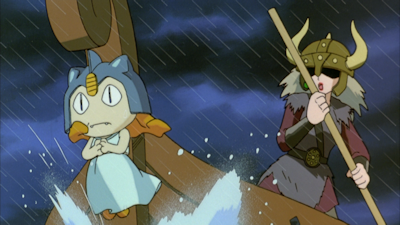
| Japanese
(original) |
Japanese
(translated) |
English
Dub |
| ムサシ 「えいっ!」 |
Musashi: "One two three..." |
Jessie: "Stroke!" |
| コジロウ 「やこーら」 |
Kojirou: "Heave!" |
James: "Uh!" |
| ムサシ 「えいっ!」 | Musashi: "One two three..." | Jessie: "Stroke!" |
| コジロウ 「やこーら」 | Kojirou: "Heave!" | James: "Uh! Uh" |
| ムサシ 「えいっ!」 | Musashi: "One two three..." | Jessie: "Stroke! Stroke!" |
| コジロウ 「やこーら」 | Kojirou: "Heave!" | James: "Uh!" |
| ムサシ 「えいっ!ん?えいっ!」 | Musashi: "One two three...I
can't hear you! One two three..." |
Jessie: "Stroke! Uh I think
I'm going to have one." |
| コジロウ 「やこーら」 | Kojirou: "Heave!" |
Attitudes toward making a mockery of life threatening medical emergencies have changed in the quarter century or so since the English dub came out, but back in 1999 this would have been a perfectly acceptable joke to insert into a kids' movie! As you can see there's no similar banter in the Japanese original.
Brock and Ash are happy to have found a boat:

| Japanese
(original) |
Japanese
(translated) |
English
Dub |
| タケシ 「”渡りに船”とはこのことだな」 |
Takeshi: "I guess this is what
they mean when they say 'our ship's sailed in,' huh?" |
Brock: "I didn't know Vikings still existed." |
| サトシ 「俺たちツイてたよな」 |
Satoshi: "We really lucked
out." |
Ash: "They mostly live in Minnesota." |
Originally, Takeshi's line is "Watari ni fune" to wa kono koto da na (”渡りに船”とはこのことだな). The joke here is that watari ni fune, which is an idiom that means "how convenient," also just happens to have the word "boat" (fune) in it. I guess an English equivalent would be something like "looks like our ship sailed in" and so that's what I put in my translation above.
The dub's Minnesota Vikings rewrite is one of the more infamous changes in this movie because of how utterly perplexing it is to everyone outside the United States. Viewers in countries that play the 4Kids English dub as-is -- so Canada, the U.K., Australia, New Zealand, etc. -- don't typically follow American football and would therefore have had no reason to know what in the world Ash is talking about here. "Why did Ash say 'Minnesota'?" "What is the connection between 11th century sailors and this random place in the U.S.?" "Is Minnesota one of the 50 states?" Etc. etc. And then, every other country who has to dub this movie into their own language -- since non-Asian foreign language dubs all have to be based on the English dub, not the Japanese original -- would have had to write this off as an untranslatable joke and just redo it altogether.
If you're in the U.S. then this is a funny little joke, I guess, but if you're literally anywhere else in the world this is just another example of cheesy 90s American dubbing in action.
Misty's worried about the boat:

| Japanese
(original) |
Japanese
(translated) |
English
Dub |
| カスミ 「でもこんな船で本当に大丈夫なの?」 |
Kasumi: "But are you sure this
boat's safe?" |
Misty: "Something's not right.
Are you sure this boat's safe?" |
| ピカチュウ 「ピカ!」 |
Pikachu: "Pika!" |
Pikachu: "Pika!" |
| サトシ 「うあっ」 |
Satoshi: "Uwa-!" |
Ash: "Uwa-!" |
| ムサシ 「こんな波どうってことないよ。こちとらグレン海峡の荒波で産湯につ
かったってもんだい」 |
Musashi: "Don't worry. The
first bath I ever took as a baby was in the choppy waves of the Guren
strait. Waves like these are nothing to us." |
Jessie: "Don't vorry. This
ship von't let you down. Ve alvays sail in da rough veather. Don't get
upset." |
| ニャース 「何だかニャ~」 |
Nyarth: "What's she talking
about Nya?" |
Meowth: "Tell my stomach." |
Musashi ties in a video game location (Guren Island, aka "Cinnabar Island") and makes up a backstory to help earn the children's trust while Jessie does not.
The next portion of the movie shows our heroes getting through the storm, and it's a nice little break for me because the lack of dialogue means there are fewer places for 4Kids to insert its rewrites.
The next script change we get is when Brock recognizes Nurse Joy:

| Japanese
(original) |
Japanese
(translated) |
English
Dub |
| タケシ 「船着き場の捜索願で見たジョーイさん」 |
Takeshi: "You're the Joy-san
on the missing persons poster back at the dock." |
Brock: "Aren't you the nurse
who's missing from the treatment center?" |
| カスミ 「そういえば似てるかも」 |
Kasumi: "Now that you mention
it they do kind of look alike." |
Misty: "You do look just like
her." |
| ジョーイ 「何のことでしょう。私は生まれた時からこの城にお仕えしてる身でご ざいます。さっ、こちらへどうぞ。他の招待客の皆様は既におそろいです」 | Joy: "I'm afraid I have no
idea what you're talking about. I've been serving at this castle ever
since I was born. Now please, come this way. The other guests are
already waiting." |
Nurse Joy: "I fear you are
mistaken. I have always dwelt on this island and have always been in
the service of my master. Please, come this way. My master awaits your
arrival." |
There are a lot of small changes here and there (plus Brock weirdly referring to a Pokémon Center as a "treatment center," for some reason) but the biggest one comes at the very end, where Joy doesn't even bring up the other guests in the English version the way she does in Japanese.
Sound Effects Edit
Throughout the entire rest of the movie a number of ambient sound effects that're in the Japanese version get removed (or have their volume turned way, way down) for the English dub. These include things like the sounds of the waves crashing against the rocks outside Mewtwo's castle and the sound of the water running through the fountain inside the main hall, among others. At first I thought maybe the sound effects were still there but were just being drowned out by all the background music 4Kids adds to this movie but nope, they're missing from the scenes without any music in them as well. I don't know if these removals were intentional or just an oversight (maybe someone forgot to add them back into the audio mix...?) but either way, they're simply not there in the dub.
Dialogue Edit
Team Rocket plots to infiltrate Mewtwo's Palace:
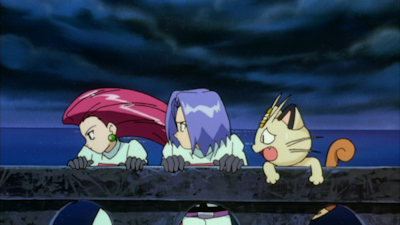
| Japanese
(original) |
Japanese
(translated) |
English
Dub |
| ニャース 「げげ…げ…下水⁉ニャ―はドブネズミじゃニャース」 |
Nyarth: "The s-s-sewer!? What
do I look like, some kind of sewer rat Nya!?" |
Meowth: "Bwa! But Jessie! How we gonna swim up dat t'ing?" |
| ムサシ 「文句言わない!」 |
Musashi: "Stop complaining!" |
Jessie: "Pretend you're a catfish." |
There's actually a Japanese pun at work here. Nyarth says he's no dobunezumi (ドブネズミ), a word that can mean both "sewer rat" and "secret evil-doer." 4Kids could have played with the way "rat" and "cat" sound alike, but it went with the catfish thing instead.
Back in the castle, Mewtwo is referred to as the "greatest Pokémon Master on Earth" several more times. Again, no one ever refers to Mewtwo as a "Pokémon Master" in the Japanese version.
Ash and his friends start meeting the other party guests:

| Japanese
(original) |
Japanese
(translated) |
English
Dub |
| ソラオ 「君たちも来たんだね」 |
Sorao: "Ah, so you three also
made it." |
Corey:
"What took you guys so long?" |
| サトシ 「あ…君は…」 |
Satoshi: "Hey, aren't you..." |
Ash: "Ah...how'd you get here?" |
| ソラオ 「僕は空を飛んできた。僕のピジョットならハリケーンなんてひとっ飛び
さ」 |
Sorao: "Yup. I flew over here.
Even a hurricane is just a hop, skip, and a jump for my Pigeot here." |
Corey: "I decided to fly over. It was easy. Hurricane winds are a breeze for Pidgeotto here." |
English dub-only Pokémon misidentification #1 happens here, with Corey referring to his Pidgeot as a Pidgeotto. As you can see that same mistake's not made in the original.
Mewtwo arrives at the party:
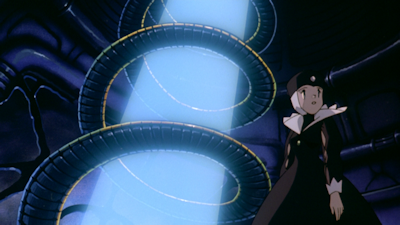
| Japanese
(original) |
Japanese
(translated) |
English
Dub |
| ジョーイ 「皆様、お待たせいたしました。最強のポケモントレーナーがおいでに
なられます」 |
Joy: "Ladies and gentleman,
sorry to keep you waiting. Please help me welcome the world's strongest
Pokémon Trainer." |
Nurse Joy: "You are about to
meet my master. The time has come for your encounter with the greatest
Pokémon Master on Earth." |
We get "Pokémon Master" again but also, the dub refers to the Pokémon World as "Earth" here, something the shows and movies really aren't supposed to be doing, even this early in the franchise's history..
After the Rocket sewer scene we go right back to the introductions:
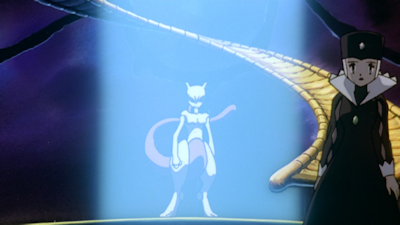
| Japanese
(original) |
Japanese
(translated) |
English
Dub |
| ジョーイ 「そう。この方は最強のポケモントレーナーにして最強のポケモンであ
らせられるミュウツー様です」 |
Joy: "That's right. This is
both the world's strongest Pokémon Trainer and the world's
strongest Pokémon, Lord Mewtwo." |
Nurse Joy: "Yes. The world's
greatest Pokémon Master is also the most powerful Pokémon
on Earth. This is the ruler of New Island and soon the whole world.
Mewtwo." |
| サトシ 「ミュウ…ツー?」 | Satoshi: "Mew...two?" |
Ash: "Mew...two?" |
| ピカチュウ 「ピカ?」 |
Pikachu: "Pika?" |
Pikachu: "Pika?" |
| ウミオ 「ポケモンがポケモントレーナー?バカな!」 | Umio: "A Pokémon is a
Pokémon Trainer!? Don't be ridiculous!" |
Fergus: "A Pokémon
can't be a Pokémon Master! No way!" |
| ミュウツー 「いけないか?私のルールは私が決める」 |
Mewtwo: "You're saying that's
not allowed? I make my own rules." |
Mewtwo: "Quiet, human. From now on I am the one who makes the rules." |
There's a lot going on here. We get the "Pokémon Master" and "Earth" rewrites we saw earlier, but that's not all; we also get the first inklings of the "Mewtwo wants to rule the world" subplot 4Kids will add to the movie.
Mewtwo throws Fergus across the room:
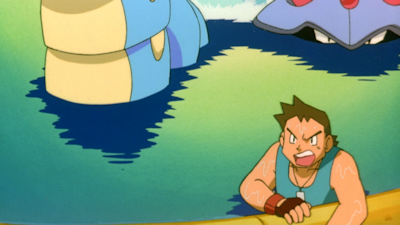
| Japanese
(original) |
Japanese
(translated) |
English
Dub |
| ウミオ 「うっねんりきか?いけギャラドス!」 |
Umio: "Ugh, so that was a
Confusion attack? Alright, our turn Gyarados!" |
Fergus: "We'll show you! Let's
go, Gyarados!" |
Umio guesses the attack Mewtwo just used to throw him across the room might be Confusion (ねんりき) but Fergus doesn't do the same.
Joy wakes up:
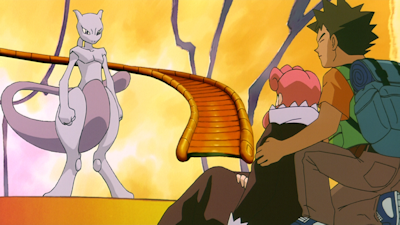
| Japanese
(original) |
Japanese
(translated) |
English
Dub |
| ジョーイ 「ここはどこ?どうしてこんな所にいるの?」 |
Joy: "Where am I? What am I
doing in a place like this?" |
Nurse Joy: "Where am I? And
how in the world did I get here?" |
| ミュウツー 「私の世話をさせるためポケモンセンターから連れてきた。ポケモン
の体のことに詳しい医者は便利だ。ずいぶん役に立った。お前は何も覚えていないだろうがな」 |
Mewtwo: "I brought you from
the Pokémon Center so you could take care of me. It's convenient
having a doctor around who knows so much about Pokémon
physiology, you see. You really were a big help. But you don't remember
anything that happened, do you?" |
Mewtwo: "You have been under
my control. I transported you here from the Pokémon Center. Your
knowledge of Pokémon physiology proved useful for my plan. And
now I have cleansed your tiny human brain of memories from the past few
weeks." |
"The past few weeks" part is exclusive to the dub.
You can also see an example of English dub Mewtwo being extremely condescending toward the people it invited to its party ("your tiny human brain") when absolutely none of that's in the Japanese equivalent of these lines.
Brock and Mewtwo continue:
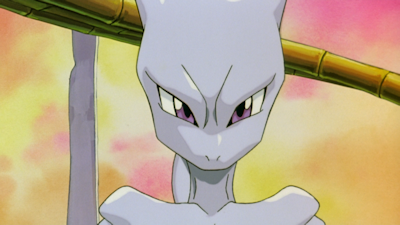
| Japanese
(original) |
Japanese
(translated) |
English
Dub |
| タケシ 「何だって⁉」 |
Takeshi: "What're you saying?" |
Brock: "Who are you!?" |
| ミュウツー 「人間など私の力を持ってすればどうにでも操れる」 |
Mewtwo: "If you have power
like mine then you can make creatures like humans do whatever you want." |
Mewtwo: "I am the new ruler of
this world, the master of humans and Pokémon alike." |
| カスミ 「ひどいことを」 |
Kasumi: "That's awful!" |
Misty: "You're just a bully!" |
| ピカチュウ 「ピカ」 |
Pikachu: "Pika!" | Pikachu: "Pika!" |
Original Mewtwo confirming that it was indeed controlling Joy's mind is replaced with generic bad guy dialogue for the English dub.
Team Rocket stumbles upon Mewtwo's lab:

| Japanese
(original) |
Japanese
(translated) |
English
Dub |
| ニャース 「かわいいニャ」 |
Nyarth: "They're so cute Nya!" |
Meowth: "They're
Pokémon!" |
| コジロウ 「かわいいか?」 |
Kojirou: "These are?" |
James: "Are...they real?" |
Nyarth's first reaction to seeing a bunch of Copy Pokémon is to say they're cute and blush, while Meowth's reaction to seeing a bunch of Copy Pokémon is to say they're Pokémon...and blush. Um, sure, OK!
Jessie butt dials the computer:

| Japanese
(original) |
Japanese
(translated) |
English
Dub |
| 博士 「ここに我々の研究を記録…これはポケモンのコピーを作る機械の全体図だ
が…コピーは…前進した…そのためにサンプルが必要だったので…」 |
Doctor: "This will serve as a
record of our research... this is an overall blueprint of the machine
that will create Copy Pokémon, however... the Copies have...
progressed forward...for which a sample was needed..." |
Computer: "This is the
Pokémon replication system. System activated. Pokémon
based on genetic analysis. Pokémon DNA sampling sequence now in
progress. |
The computer narration is very different depending on which version you're watching. In the Japanese original the Rocket trio's listening to an old recording made by Dr. Fuji back when he was still alive, and the audio quality has deteriorated accordingly. The doctor's voice is distorted, and the sound keeps cutting in and out as if the audio file itself is corrupted. In the English dub, meanwhile, a random female voice appears to be narrating its boot up process out loud without any of the distortion heard in the original.
The computer takes a sample of Meowth's hair:

| Japanese
(original) |
Japanese
(translated) |
English
Dub |
| ムサシ 「あっ、毛が3本」 |
Musashi: "Ah, three of your
hairs." |
Jessie: "Look, there's your
hair." |
| 博士 「ほんのわずかでもいい。気になるポケモンの成分を調べれば元のポケモン
のコピーが作れるはずなんだ」 |
Doctor: "Even a small sample
is sufficient. You just need to look into the physiology of whatever
Pokémon you're interested in to be able to create a copy
of the original." |
Computer: "Analyzing
Pokémon biomaterial sample. Analysis complete. Pokémon
identified. Begin replication sequence." |
The fact you only need a small DNA sample to create an entire Copy is kind of an important point that the dub just glosses over for whatever reason. You can get that information from "The Uncut Story of Mewtwo's Origin," sure, but that's not included in the version most English dub viewers have seen and so this actually really would have been a great place to put that information.
After the Rocket trio sees Meowth's clone the computer continues. This is a bit long so I'll break it down into parts:

| Japanese
(original) |
Japanese
(translated) |
English
Dub |
| 博士 「だが我々の作りあげたコピーは想像以上だった…洞窟で発見された伝説の
ポケモン。その名はミュウ。」 |
Doctor: "But the Copy we made
exceeded our expectations... of a legendary Pokémon discovered
in a cave. Its name is Mew. " |
Dr. Fuji: "I haven't got much
time. I pray this record of our experiment survives. A year ago we
discovered a fossil what proved to be the remains of the ancient
Pokémon, Mew.." |
The English dub switches over from the modern day female computer voice-over it had been using up until this point to an old recording of Dr. Fuji despite nobody pressing any buttons or doing anything else to cause this change to happen. The dub also adds in all these explosions and the sound of people screaming in the background that weren't there in the original.
Also not in the original is any mention of the team finding Mew's fossil "a year ago."
The computer continues:
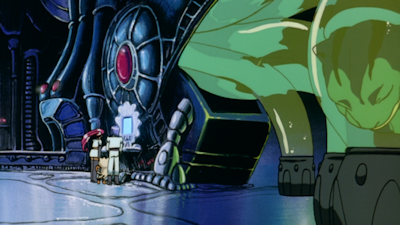
| Japanese
(original) |
Japanese
(translated) |
English
Dub |
| 博士 「化石かしたミュウのまつげを見つけることに成功した…
持ち帰ったそのポケモンの成分から我々はこの機械によってミュウツーを作り出した…」 |
Doctor:
"We successfully found a
fossilized eyelash of a Mew... from the elements of the Pokémon
we
brought back we created Mewtwo using this machine... " |
Dr. Fuji:
"There was sufficient genetic
material to replicate Mew, but Giovanni, who funded our project,
insisted we try to design super clones more powerful than any living
Pokémon. Many attempts failed, but finally our experiments
proved
successful." |
The Japanese version tells us that the very machine the Rocket trio's looking at is what was used to create Mewtwo when that same information isn't provided in the English version.
Meanwhile, the dub has the Rocket trio learn that Giovanni is actually the one who funded this whole operation and yet Jessie, James, and Meowth have absolutely zero reaction to this revelation. Wouldn't you think they'd be freaking out, even just a tiny bit, if they found out their Boss had anything to do with the situation they're in right now? Shouldn't 4Kids have considered this before being so cavalier with its rewrites?
We're not done:

| Japanese
(original) |
Japanese
(translated) |
English
Dub |
| 博士
「世界最強のポケモンを作る。それが私たちの夢だった。だが…ミュウツー
は計り知れない凶暴性を発揮した…もうおしまいだ…この研究所は破壊されてしまう残された道は…ここを捨てて逃げるしかないのだ」 |
Doctor:
" 'Create the
world's strongest Pokémon.' That was our dream... Mewtwo has
unleashed
an intense viciousness... it's all over now... now that this
laboratory is being destroyed the only path left for us... is to leave
this
place behind and make a run for it..." |
Dr. Fuji:
"We produced a living Pokémon. We called it...Mewtwo. But
for some reason the creature's anger is out of control. With its
psychic powers it is destroying our laboratory. We dreamed of creating
the world's strongest Pokémon...and we succeeded." |
The two versions are pretty similar but there are still juuuuuust enough differences between the two of them to warrant a mention here.
The Rocket trio reacts to all this:
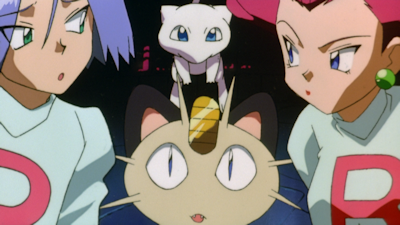
| Japanese
(original) |
Japanese
(translated) |
English
Dub |
| ムサシ 「研究所ってここのこと?」 |
Musashi: "Does that mean that
lab...is here...?" |
Jessie: "Sounds like a real
Pokénstein." |
| コジロウ 「だよね」 |
Kojirou: "Seems that way." |
James: "Sure does." |
| ニャース 「だニャ」 |
Nyarth: "Yup Nya." |
Meowth: "One baaaa~d cat." |
| ムサシ 「だよね」 |
Musashi: "Yeah..." |
|
| コジロウ 「でも何ともないような」 |
Kojirou: "But you can't tell
anything happened here." |
James: "So this must be the
lab." |
| ムサシ 「誰かが作り直したとか?」 |
Musashi: "Someone must've
rebuilt it." |
Jessie: "But if Mewtwo
destroyed it..." |
| コジロウ 「えっ…って誰が?」 |
Kojirou: "You think? But
who...?" |
James: "Somebody rebuilt it." |
| Jessie: "Yes, but who?" |
I guess Mary Shelley exists in the English dub canon of the Pokémon World? Also, 4Kids gives Musashi's lines to James and Kojirou's lines to Jessie, for some reason.
Back in the main hall:

| Japanese
(original) |
Japanese
(translated) |
English
Dub |
| ミュウツー 「私は1度は人間と一緒にやろうと思った。だが私は失望した。人間
はポケモンに劣るも最低の生き物だ。人間のように弱くてひどい生き物が支配していたらこの星はダメになる」 |
Mewtwo: "There was a time when
I thought I'd try working with humans. But I was left disappointed.
Humans
are the worst, even lower than Pokémon. If creatures as weak and
horrible as humans were to rule this planet then I'm afraid it'd be
doomed." |
Mewtwo: "You humans are a dangerous species. You brought me into your world with no purpose but to be your slave. But now I have my own purpose. My storm will create my own world...by destroying yours!" |
| タケシ 「じゃあお前のような…ポケモンがこの星を支配するってのか?」 |
Takeshi: "So you're saying
only someone like you...only a Pokémon should rule this world?" |
Brock: "So you hate all humans...and you're gonna destroy us to save Pokémon." |
| ミュウツー 「ポケモンもダメだ。なぜならこの星を人間に支配されてしまった。
人
間のために生きているポケモンさえいる」 |
Mewtwo: "Pokémon are no
good either. Because they sat by and allowed humans to rule this
planet. Some of
them even live for the sake of humans." |
Mewtwo: "No. Your Pokémon will not be spared. They have disgraced themselves by serving humans. Those Pokémon are nothing but slaves." |
Here, the English dub introduces its "Mewtwo is going to summon a giant storm to kill everyone in this movie," a plot point that does not exist in any way, shape, or form in the original. Instead, Mewtwo explains why it hates humans the way it does (its partnership with Sakaki) and why it doesn't believe either humans or Pokémon are fit to rule this world.
Pikachu objects:
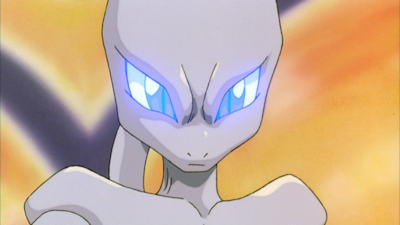
| Japanese
(original) |
Japanese
(translated) |
English
Dub |
| ピカチュウ 「ピカ ピカピカ」 |
Pikachu: "Pika Pika Pika" |
Pikachu: "Pika Pika Pika" |
| ミュウツー 「何だと?"いいなりになんてなっていない" "好きでそのトレー
ナーと一緒にいる"?」 |
Mewtwo: "What's that? 'We
don't just do whatever we're told?' 'I'm with this Trainer because I
like him'?" |
Mewtwo: "So, you say I am
wrong? That you are not this human's servant? You are his friend?" |
| ピカチュウ 「ピカ」 |
Pikachu: "Pika." |
Pikachu: "Pika." |
| ミュウツー 「一緒にいること自体が間違っている」 |
Mewtwo: "Even just being
together with a human is wrong." |
Mewtwo: "You are as pathetic
as the rest." |
| (Mewtwo throws Pikachu across the room) |
||
| ミュウツー 「弱いポケモンは人にすり寄る」 | Mewtwo: "It's the weak Pokémon who're the ones who get close to humans." | Mewtwo: "Humans and Pokémon can never be friends." |
Mewtwo's first line is...OK-ish, I guess, but its second line and third lines are complete rewrites.
After Mewtwo makes quick work of Rhyhorn:

| Japanese
(original) |
Japanese
(translated) |
English
Dub |
| ミュウツー 「ムダだ。私はこの星のいかなるポケモンよりも強く生まれてきた」 |
Mewtwo: "It's no use. I was
born stronger than any other Pokémon on this planet." |
Mewtwo: "Fools. Your
Pokémon attacks cannot weaken me. My powers are too great. No
Trainer can conquer me." |
| サトシ 「そんなことやってみなきゃ分かんないだろ」 |
Satoshi: "We can't possibly
know that until we try for ourselves." |
Ash: "Then you won't mind
proving it in a real match!" |
| ミュウツー 「やってみるか?」 |
Mewtwo: "So you're saying
you'd like a go?" |
Mewtwo: "Is that a challenge?" |
| サトシ 「望むところだ」 |
Satoshi: "Absolutely!" |
Ash: "You bet it is!" |
This is aaaaaaallllllmost close enough for me to avoid having to mention it in this comparison, but Ash's "a real match" is what prompted me to transcribe this. What does he mean by that? Does Ash think challenging Mewtwo to something like an official Pokémon League match is what will get under its skin?
Sound Effects Edit
The dub adds this disgusting squelching noise when the cloned starters start emerging from their birthing pods.
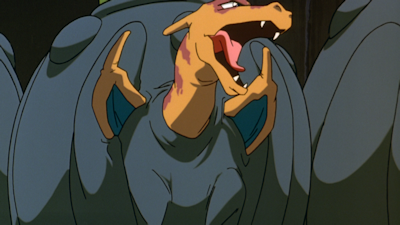
The thing is...there was already a sound here in the Japanese version, but for some reason 4Kids went to the trouble of recording a brand new sound for this, because......?
Dialogue Edit
After the clones leave the machine room the Rocket trio finally sees Mew:
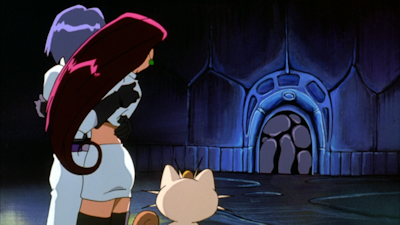
| Japanese
(original) |
Japanese
(translated) |
English
Dub |
| コジロウ 「鳴いた?」 |
Kojirou: "Did you hear that?" |
James: "I'm scared." |
| ニャース 「飛んだ」 |
Nyarth: "That thing that just
flew by?" |
Jessie: "Me too." |
| ムサシ 「"ミュウ"っと」 |
Musashi: "It said "Mew."" |
Meowth: "Me-owth!" |
Jessie, James, and Meowth have zero reaction to the super rare Mythical Pokémon they just saw fly by them while Musashi, Kojirou, and Nyarth very much do.
Mewtwo introduces the clones:

| Japanese
(original) |
Japanese
(translated) |
English
Dub |
| ミュウツー 「ポケモントレーナーを目指す人間の誰もが最初に手に入れたがるヒ
トカゲ、ゼニガメ、フシギダネ。このものたちは私が作ったその進化形のコピー」 |
Mewtwo: "Hitokage, Zenigame,
and Fushigidane are the first Pokémon anyone who wants to become
a
Pokémon Trainer wants to get. The ones you see before you are
Copies I made of their evolved forms." |
Mewtwo: "Like most Pokémon Trainers I, too, began with Charmander, Squirtle, and Bulbasaur. But for their evolved forms, I used their genetic material to clone even more powerful copies." |
By this point in the film Japanese Mewtwo's already dropped the whole "I'm a Pokémon Trainer" thing -- that was just a story it used to lure other Trainers to its island -- but apparently English Mewtwo is still going with the bit!
After Mewtwo reveals its stadium:

| Japanese
(original) |
Japanese
(translated) |
English
Dub |
| ソラオ 「僕にはフシギバナのバナードがいる」 |
Sorao: "I've got Banard, my
Fushigibana!" |
Fergus: "Your fake Venusaur
can't beat my real one! Right Bruteroot?" |
| フシギバナ 「バナー」 |
Fushigibana: "Banaa" |
Venusaur: "Saur!" |
| スイート 「私にはカメックスのクスクスがいるわ」 |
Sweet: "I have Kusukusu, my
Kamex." |
Neehsa: "We'll blow away that
Blastoise, won't we Shellshocker?" |
| カメックス 「カメー」 |
Kamex: "Kameh!" |
Blastoise: "Blaas!" |
| サトシ 「俺だってリザードンがいる。リザードン、君に決めた」 |
Satoshi: "And I've got
Lizardon. Lizardon, I choose you!" |
Ash: "It may not have a
nickname, but I do have...Charizard. I choose you!" |
One thing that's very important to note is that, at this point in the movie, absolutely no one is talking about how "real" Pokémon are better than the "copies." Fergus' line here is unnecessarily harsh.
We also get to see what the Trainers nickname their Pokémon, and...eh. The Japanese names aren't super creative, either, so I can't be mad at "Bruteroot" or "Shellshocker," though I will point out that the latter is too long for it to be used as a nickname in the 8-bit video games.
I will say one nice thing about this dub, though; I do kind of like the addition of Ash mentioning his Pokémon not having a nickname the way the others do.
Ash's Charizard
attacks Mewtwo before the real battle starts:

| Japanese
(original) |
Japanese
(translated) |
English
Dub |
| ミュウツー 「ずいぶんしつけの悪いリザードンだな」 |
Mewtwo: "That Lizardon doesn't
have any manners, does it?" |
Mewtwo: "Your Charizard is
poorly trained." |
Didn't dub Mewtwo just go on this long speech about how Pokémon allowing themselves to be subservient is part of why it won't spare their lives, and yet here it is criticizing Charizard...for not allowing itself to submit to its human and allow itself to be trained...? *shrugs*
Mewtwo takes out Bruteroot and Shellshocker:

| Japanese
(original) |
Japanese
(translated) |
English
Dub |
| カスミ 「サトシ、気を付けて。向こうの技は強力よ」 |
Kasumi: "Satoshi, be careful!
Their attacks are really powerful!" |
Misty: "You better forfeit,
Ash. Those clones are too powerful!" |
| サトシ 「分かってるって」 |
Satoshi: "I can see that." |
Ash: "I'm not giving up." |
As you can see, Kasumi isn't quite as pessimistic about Satoshi's chances of victory as her English dub counterpart is.
Toward the end of the Charizard vs. Charizard battle:

| Japanese
(original) |
Japanese
(translated) |
English
Dub |
| ミュウツー 「ちきゅうなげ」 |
Mewtwo: "Seismic Toss." |
Mewtwo: "Finish it." |
This Pokémon attack gets removed from the English dub.
After winning the battle, Mewtwo starts gathering the other's Pokémon:

| Japanese
(original) |
Japanese
(translated) |
English
Dub |
| カスミ 「人のポケモンを取る気なの?」 |
Kasumi: "So you're just going
to take other people's Pokémon?" |
Misty: "What are you gonna do with those Pokémon?" |
| ミュウツー 「取る?いや。お前たちが自慢するポケモンより更に強いコピーを作
るんだ。私にふさわしい」 |
Mewtwo: "Take? No, I'm going
to use them to make even stronger copies of the Pokémon you all
cherish so much. Copies that are worthy of me." |
Mewtwo: "I will extract their DNA to make clones for myself. They will remain safe on this island with me while my storm destroys the planet." |
| タケシ
「コピーだと?」 |
Takeshi: "Copies?" |
Brock: "You can't do this!" |
Again, there is no massive world ending storm in the original.
Norman Grossfeld actually does explain the rationale behind this addition in the DVD commentary so I'll transcribe his rationale here:
| Norman
Grossfeld:
"And just to clarify, something that we put in our version of the movie
that wasn't clear...because we wound up adding this, is exactly what
was Mewtwo's plan? We knew he's capturing all these Pokémon to
make
clones, and to what purpose we weren't quite sure when we first viewed
the original Japanese version of the movie. Ultimately we decided that
his purpose was to have the clones survive with him on the island while
he kicks that storm outside into high gear, basically wiping out life
on Earth, and he and the Pokémon that he cloned would remain
safe on
the island in the eye of the storm that he had created." |
Japanese Mewtwo doesn't need all that. "Who am I?" "Why am I alive?" "What value does my existence have?" All it wants to do is answer these questions, and decides that the best way to do so is to put its power to the test. Is it stronger than the strongest Pokémon Trainers it's able to find? Is it stronger than Mew? Can Copies be stronger -- and therefore have more of a reason to live -- than the Originals? Mewtwo's not out to destroy the world, and while it does mention the qualifications needed to rule the planet a few times, that's not its endgame. Mewtwo is just trying to figure itself out. Nothing more, nothing less.
One of the things about the localization of this movie, in particular, is how 4Kids will search for these random problems in this movie and then decides to "fix" them by coming up with its own explanations. But this whole "destroy the world" thing doesn't really make any sense either. Mewtwo wants to destroy the world, and then after it's destroyed...will rule whatever's left? Which, according to Mewtwo here, will just be the clone Pokémon there on New Island? Pokémon who, as we see throughout the film, are already pretty much under its rule already?
The next few minutes of the movie are the Mewtwo Ball scenes, and they mercifully have almost no dialogue for 4Kids to rewrite. The next rewrite occurs after Ash and Pikachu are dropped off on the conveyor belt of Mewtwo's machine, when the Rocket trio starts misidentifying Pokémon:

| Japanese
(original) |
Japanese
(translated) |
English
Dub |
| ムサシとコジロウ 「だ~れだ?ストライク。ジュゴン。ラフレシア」 |
Musashi and Kojirou: "Who's
that Pokémon? It's Strike. Jugon. Rafflesia." |
Jessie and James: "There
goes...Alakazam. Dewgong. Vileplume." |
And then a few seconds later:
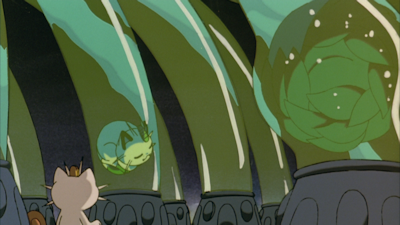
| Japanese
(original) |
Japanese
(translated) |
English
Dub |
| ニャース 「サンドパン。ニドクイン。シャワーズ」 |
Nyarth: "Sandpan. Nidoqueen.
Showers." |
Meowth: "Sandshrew. Nidoqueen.
Vaporeon." |
In the DVD commentary for the first movie, the writers try to explain these mistakes away by saying that it's perfectly in-character for the trio to not know certain Pokémon. Which, ignoring the fact that it's not for a second (the Rocket trio can be absentminded at times, but they do know the difference between a freaking Scyther and an Alakazam), that still doesn't explain why Corey wouldn't know his own Pidgeot earlier in the movie.
4Kids just...messed up. It's that simple.
Ash gets off the conveyor belt:

| Japanese
(original) |
Japanese
(translated) |
English
Dub |
| ムサシ 「ジャリボーイ!」 |
Musashi: "The twerp!" |
Jessie: "Look there!" |
| サトシ 「ロケット団!悪いけど今日は相手をしている暇はない」 |
Satoshi: "The Rocket-Dan!
Sorry, but I don't have time to deal with you today." |
Ash: "I don't have time for
your dumb motto today!" |
Satoshi goes from politely declining to play with his best friends to rudely insulting their motto instead!
Mewtwo's clones start to emerge from the cloning machine after Ash breaks it. The Rocket trio reacts:
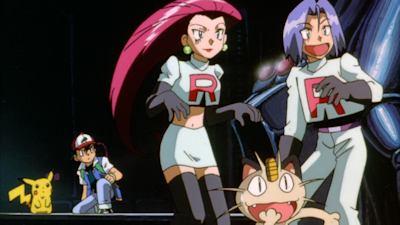
| Japanese
(original) |
Japanese
(translated) |
English
Dub |
| ムサシ 「あらら出てきた」 |
Musashi: "Oh wow, look at them
go." |
Jessie: "They're fabulous
fakes!" |
| ニャース 「ニャ―のコピーも」 |
Nyarth: "There's my Copy too,
Nya." |
Meowth: "Send in the clones!" |
| サトシ 「あれが全部コピー?」 |
Satoshi: "Those are
all...Copies?" |
Ash: "But where are the real
ones?" |
| ピカチュウ 「ピカ?」 |
Pikachu: "Pika?" | Pikachu: "Pika?" |
At this point in the movie Satoshi has only had very limited exposure to Mewtwo's Copies and almost none with its Pokémon Copy Machine, making his reaction here perfectly reasonable. Ash's line is fine, but having Ash say the line he says makes it seem like he has no reaction to seeing a bunch of clones born right in front of his eyes.
The Rocket trio continues performing schtick:

| Japanese
(original) |
Japanese
(translated) |
English
Dub |
| コジロウ 「あら?コピーが…」 |
Kojirou: "Oh, the Copies
are..." |
James: "I wonder if they
feel..." |
| ニャース 「どこ行くニャ?」 |
Nyarth: "Where are they going
Nya?" |
Meowth: "Clonesome?" |
Are you done, Rocket trio? Do you have any more clone-related jokes/puns you wanna try out? No? OK good.
Mewtwo addresses the humans:
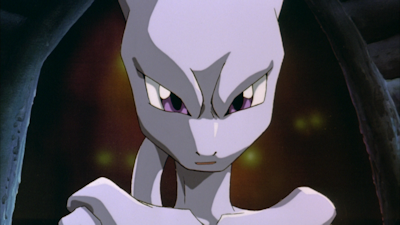
| Japanese
(original) |
Japanese
(translated) |
English
Dub |
| ミュウツー 「人間たちよ。命まで取ろうとは言わない。さっさと帰るがいい」 |
Mewtwo: "Humans, I won't tell
you I'll go so far as to take your lives. You should hurry up and go
home..." |
Mewtwo: "Humans, you have served my purpose. I am sparing your lives...for the moment." |
| Mewtwo
opens the doors to the outside world |
||
| ミュウツー 「あの嵐の中を帰れればな」 |
Mewtwo: "If you can
make it through that storm, that is." |
Mewtwo: "But you cannot escape your fate. The hour of my vengeance draws near." |
Japanese Mewtwo is pretty much done with humans at this point. It doesn't particularly care if the ones he dragged to this island live or die, and as soon as they're gone Mewtwo will go back to focusing on itself and the Pokémon Copies it made. English dub Mewtwo, meanwhile, is still bent on its world domination kick and reminds the audience that its goal is to wipe everyone in the world out with its massive storm.
An explosion draws everyone's attention:
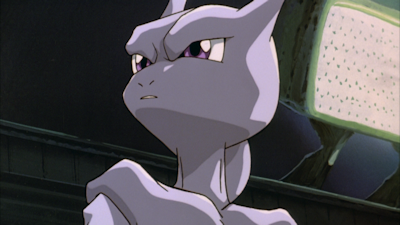
| Japanese
(original) |
Japanese
(translated) |
English
Dub |
| ミュウツー 「何事だ?」 |
Mewtwo: "What's this!?" |
Mewtwo: "Behold!" |
| Everyone gasps
as the smoke starts to clear |
||
| ミュウツー
「...」 |
Mewtwo: (no dialogue) |
Mewtwo: "With Pokémon
and humans eliminated the clones shall inherit the world." |
Does the screenshot above look like the face of someone proudly showing off its creations? "Behold! My army of clone Pokémon! I'm not really sure why there was that huge explosion just now, or why my creations have suddenly started marching toward me either, but, um...behold~~~!"
Originally Mewtwo wonders what in the world is going on.
Ash arrives on
the scene:
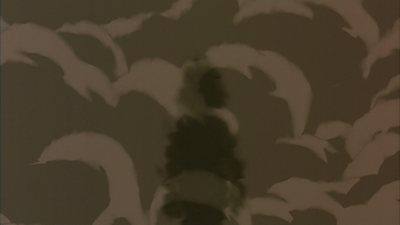
| Japanese
(original) |
Japanese
(translated) |
English
Dub |
| サトシ 「許せない。お前なんか許さない」 |
Satoshi: "I can't forgive you.
I won't forgive you." |
Ash: "You can't do this. I
won't let you." |
Satoshi's line here is one of the more famous quotes among Japanese fans. The English version, meanwhile, is a bit stronger; Ash isn't saying he won't forgive Mewtwo, he's instead saying he won't let Mewtwo get away with what it's doing.
Ash gets ready to throw hands with Mewtwo:

| Japanese
(original) |
Japanese
(translated) |
English
Dub |
| ミュウツー 「お前が逃がしたのか?」 |
Mewtwo: "You let them free?" |
Mewtwo: "It is useless to
challenge me." |
| サトシ 「俺は、俺のポケモンを…俺の仲間を…守る」 |
Satoshi: "I'm going to...I'm
going to protect my Pokémon...I'm gonna protect my friends!" |
Ash: "It's not going to end
like this, Mewtwo. We won't let it. You're mine!" |
I guess the 4Kids dub doesn't like having Mewtwo never not know what's going on at any moment? That it has to be cocky and confident for pretty much the entire movie? Because that's about the only reason I can think of for changing a conversation like this.
Mewtwo meets Mew:
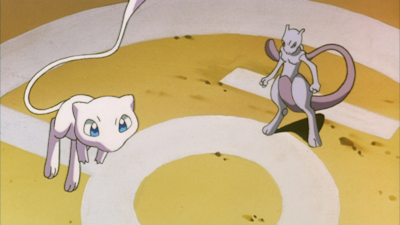
| Japanese
(original) |
Japanese
(translated) |
English
Dub |
| ミュウツー 「ミュウ。世界で一番珍しいと言われるポケモン」 |
Mewtwo: "Mew. The
Pokémon said to be the rarest in all the world." |
Mewtwo: "Mew. So, finally we
meet." |
| ウミオ 「ミュウ?」 |
Umio: "Mew?" |
Fergus: "Mew?" |
| ミュウ 「ミュウ?」 |
Mew: "Mew?" |
Mew: "Mew?" |
| ミュウツー 「確かに私はお前から作られた。しかし強いのはこの私だ。本物はこ の私だ」 | Mewtwo: "It's true I was
created from you. But I am the stronger one. I am the Original." |
Mewtwo: "I may have been cloned from your DNA but now I will prove that Mewtwo is better than the original. Superior to Mew." |
Mewtwo repeats what the doctors at the lab told it about Mew being "the rarest in the world" before declaring that it is, indeed, the Original out of the two of them. In the English dub, meanwhile, Mewtwo just boasts about how great it is while skipping all that other stuff.
After flying around a bit, Mew finally attacks back:

| Japanese
(original) |
Japanese
(translated) |
English
Dub |
| ミュウツー 「少しは手応えのある相手というわけだな。どちらが本物か決めるの
はこれからだ。ミュウと私のどちらが強いか。基のお前たちと私たちのどちらが強いか」 |
Mewtwo: "So my opponent's
going to provide a challenge? It is now time to decide which of us is
real. Which one of us is stronger? Mew or me? Which one of us is
stronger? You Originals, or me and the other Copies?" |
Mewtwo: "So, you do have some fight in you. But I
have no time for games. Destiny is at hand. Who will rule? My
super Pokémon, or your pathetic group of spineless inferior
Pokémon? |
| ミュウ 「ミュウ」 |
Mew: "Mew." | Mew: "Mew." |
| ミュウツー 「本物より我々は強くなるよう作られている」 |
Mewtwo: "But I warn you, we were created to be stronger than the Originals." | Mewtwo: "We were created with powers far stronger than the originals." |
Here we get (yet) another example of just how much Mewtwo's personality gets altered for the 4Kids dub. In the English version Mewtwo refers to the originals as a "pathetic group of spineless inferior Pokémon," with a venom toward its opponents you simply do not see in the Japanese original. Mewtwo doesn't particularly like humans or the Originals in the Japanese version, but it also doesn't hurl insults at them every chance it gets either.
Meowth translates for Mew:
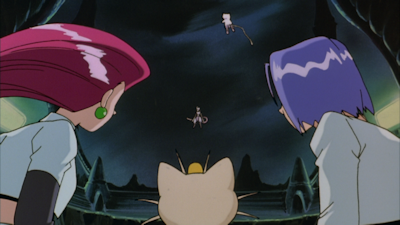
| Japanese
(original) |
Japanese
(translated) |
English
Dub |
| ニャース 「うんなるほどニャ」 |
Nyarth: "Oh, I see Nya." |
Meowth: "Mew's got a good
point." |
| ムサシ 「何だって?」 |
Musashi: "What is it?" |
Jessie: "What's it saying?" |
| ニャース 「"本物は本物だ。技など使わず体と体でぶつかれば本物はコピーに負
けない”と言ってるニャ」 |
Nyarth: "It's saying "The
Originals are the originals. The Originals won't lose to the Copies if
they fight head to head, without using any special attacks." |
Meowth: "Mew says you don't
prove anythin' by showin' off a lot of special powers and that a
Pokémon's real strength comes from da heart." |
| ムサシとコジロウ 「ふうん」 |
Musashi and Kojirou: "Oh..." |
Jessie and James: (no dialogue) |
| ミュウツー 「"本物は本物だ"…だと?」 |
Mewtwo: "'The Originals are
the originals"...?" |
Mewtwo: "My clones don't need
their powers to prove their worth." |
This is actually pretty alright; the main reason I bring this up is because mistranslations of this exchange have been popping up for years claiming that this is the part of the movie where Mew says that the Copies are inferior and all deserve to die. As you can see from the transcript above, that is very much not the case.
Mewtwo agrees to Mew's proposal:
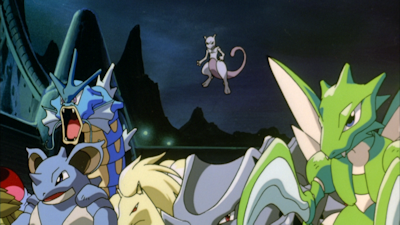
| Japanese
(original) |
Japanese
(translated) |
English
Dub |
| ミュウツー 「いいだろう。どちらが本物か技なしでも決めてやる。強いのはお前
たちだ。いけ!」 |
Mewtwo: "Fine. We'll decide
which of us is real without using any special attacks. You're sure to
win, my Copies. Now go!" |
Mewtwo: "I will block all the Pokémon's special abilities using my psychic powers. Now we shall see who triumphs. Go!" |
The English dub has it so that the Pokémon don't use their special attacks because they can't, due to Mewtwo's psychic powers. But there is no such psychic hold over the Pokémon in the original; they simply choose not to use their powers when they fight each other, out of their own volition.
The fact there isn't actually any psychic hold preventing the Pokémon from using their special attacks in the original also explains why both Satoshi's Pikachu and the Copy Pikachu are still able to use their electric attacks throughout the rest of the fight.
Music Edit
So during the fight where all the Pokémon are fighting each other, the Japanese version plays Track 20 on the movie's soundtrack, "The Originals and Copies! Which is Stronger?" (本物とコピー!強いのはどっちだ!). It's a rearranged version of a track from the TV series known simply as "1997~1998-M14," a piece of background music that's been used in the animated series multiple times at this point, even in the dub.
The English dub replaces this with a brand new vocal song called "Brother My Brother" by a group called Blessid Union of Souls.

| Japanese
(original) |
Japanese
(translated) |
English
Dub |
| (BMG
曲) |
(instrumental
background music) |
Brother, my brother Tell me what are we fighting for? We got to end this war. We should love one another Oh, can't we just pretend This war never began We can try... Brother, my brother We face each other from different sides The anger burns, can't remember why. It's kinda crazy to cause such pain. Our foolish pride makes us hate this way We watch our world fall apart. Tell me what good is it When you lose your heart? Brother, my brother Tell me what are we fighting for? Isn't life worth so much more? We should love one another Oh, can't we just pretend This war never began? Tell me why.... Brother, my brother We can try..... Brother, my brother |
Norman Grossfeld and Michael Haigney address the reason for adding this song in the DVD commentary:
| Norman
Grossfeld: "For us this next scene was a little bit
worrisome because...y'know, most people that're involved in
Pokémon are used to seeing the Pokémon battles be these
incredible displays of all these different powers and abilities that
the Pokémon have, depending on what element they're derived
from. Electrical attacks or Water attacks or whatever. And here now we
see the Pokémon basically having a fist fight, which we...we
explained away just seconds ago with Mewtwo's explanation of what he'll
be doing. But we...we decided, after scoring orchestrally this portion
of the movie, we decided to add the song, kind of juxtaposing the
message of the song with the battling you saw on screen to try to, I
guess, I dunno, diffuse a little bit of the impact of the battle scene." Michael Haigney: "Right. I guess the song kind of, as you said, juxtaposes. It works...its lyrics, and its message are kind of working against what we're seeing on the screen. We didn't want it...make it seem like we thought "Hey, this is a really great thing," because it really is kind of, as the song conveys, it's kind of against the spirit of Pokémon. That Pokémon don't fight in this way, but they battle using their abilities, and certainly not to the death. And so I think it worked pretty effectively." |
Using dub replacement music to try to soften the footage on-screen isn't a particularly new practice. The people who worked on the American Power Rangers TV series, for example, would get notes about not using music that would been seen to glorify the "violent" fight scenes for which the show was attracting so much unwanted criticism at the time.
Grossfeld and Haigney appear to be going for something similar here. The image of the Pokémon beating each other up is pretty brutal, after all. And based on the exchange above, this doesn't sound like the music replacement was a mandate from the Motion Picture Association, but more of a decision made by 4Kids on its own.
But, I do think Mr. Haigney's concerns about people mistaking this depiction of violence as being a promotion of said violence to be a bit off the mark. The Japanese version doesn't have an insert song with lyrics telling you us what we're seeing is wrong, actually, and yet we still understand that none of this is "a really great thing" because the background music that is used tells us as much. The Japanese version doesn't use some triumphant piece of music that celebrates the violence on-screen, it uses a piece of music that tells us that something really dire is happening right now. 4Kids could have done the same -- either by keeping the Japanese music as-is or by using an equally "serious" piece of music -- but I guess it wanted to give Blessid Union of Souls a paycheck instead.
Dialogue Edit
"Brother My Brother" was just the warm-up:
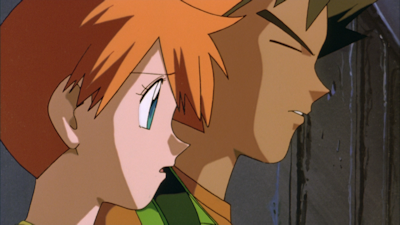
| Japanese
(original) |
Japanese
(translated) |
English
Dub |
| ジョーイ 「何なの、この戦い?本物だってコピーだって今は生きている」 |
Joy: "What's the meaning of
this fighting? It doesn't matter if they're the Original or a Copy,
they're alive either way." |
Nurse Joy: "Pokémon
aren't meant to fight. Not like this. It's useless. What can come out
of it?" |
| スイート 「みんな…生き物」 |
Sweet: "They're all...living
creatures." |
Neesha: "Nothing...but pain." |
| タケシ 「作られたといってもこの世に生きている生き物」 |
Takeshi: "Even if they were created, they're still living
creatures who exist in this world." |
Brock: "Why can't Mewtwo
understand it's not right to force Pokémon to battle this way." |
| カスミ 「本物とコピー…でも同じ生き物同士。勝ち負けがあるわけ?」 |
Kasumi: "Originals and
Copies...they're all alive, just the same. So there's no winning or
losing here." |
Misty: "They're all living
creatures. This just proves that fighting is wrong." |
Pretty much all the critics who trashed this movie when it first came out -- and there were a ton! -- pointed to the movie's message of "fighting is wrong!" as confusing and hypocritical. And, well, that's because it is! Now, Nurse Joy does say "it's not right to force Pokémon to battle this way," implying she recognizes the difference between the friendly sparring matches Pokémon are usually known for and this rage filled beatdown unfolding before her, but then both Misty comes out with this sweeping "all fighting is wrong!" line that totally destroys any nuance that message may have had. Fighting is wrong, suddenly!
In the original, the conversation is more about how it doesn't matter if you're the Original or the Copy; you're a living creature either way.
The Rocket duo chimes in:

| Japanese
(original) |
Japanese
(translated) |
English
Dub |
| コジロウ 「何だかんだと言われたら…何だかな」 |
Kojirou: "If we're asked about
this or that...well, what is this?" |
James: "I was prepared for
trouble, but not for this." |
| ムサシ 「何だか気の毒で気の毒で」 |
Musashi: "Whatever it is, I
feel sorry for them." |
Jessie: "Make that double for
me." |
| コジロウ 「自分で自分をいじめてる」 |
Kojirou: "It's like they're
beating themselves up." |
James: "Now I can see how
horrible fighting really is." |
| ムサシ 「昔の自分を見るようで」 |
Musashi: "It's like they're
looking at a past version of themselves." |
Jessie: "Even the best of
friends'll fight sometimes." |
| コジロウ 「今の自分を見るようで」 |
Kojirou: "It's like they're looking at a present version of themselves." | James: "I'll promise never to
fight again if you will." |
| コジロウとムサシ 「やな感じ」 |
Kojirou and Musashi: "What a
bad feeling~!" |
Jessie and James: "Oh Jessie!
Oh James!" |
Again, more "fighting is wrong" type messaging. Originally the trio talk about how pointless the Originals vs. Copies fight is, minus the sweeping "fighting is wrong" platitudes of the English dub.
It's Meowth's turn to get one of his conversations completely rewritten:
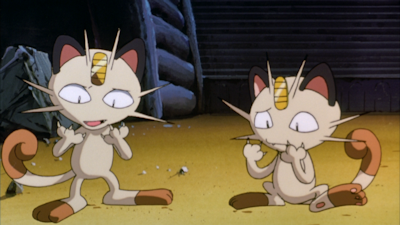
| Japanese
(original) |
Japanese
(translated) |
English
Dub |
| ニャース 「これ痛いだろうニャ」 |
Nyarth: "I guess these'd hurt
Nya." |
Meowth: "What am I doin'?" |
| ニャースツー 「ニャ~」 |
Nyarthtwo: "Nya~" |
Meowthtwo: "Nya~" |
| ニャース 「ポケモン同士みんな戦ってるのにおミャ―はズルいニャ」 | Nyarth: "But all the other
Pokémon are fighting... you're not being fair Nya." |
Meowth: "Let's get something straight, copycat. You-owth aren't gonna push Me-owth around." |
| ニャースツー 「ニャミャ~」 | Nyarthtwo: "Nya Mya~" |
Meowthtwo: "Nya Mya" |
| ニャース 「ニャに?”おミャ―のほうがズルいニャ" "なぜニャ―と戦わない?" だと?」 | Nyarth: "What'd you say?
"You're the one not being fair Nya?" "Why do we have to fight Nya?"" |
Meowth: "Y'mean...we don't have to fight wit each other? But how can I trust you? You was born different." |
| ニャースツー 「ミャミャ~」 | Nyarthtwo: "Mya Mya~" |
Meowthtwo: "Mya Mya~" |
| ニャース 「"その爪痛いだろう"って?おミャーの爪のほうがもっと痛いだろ
う] |
Nyarth: "So you're saying "It
looks like those claws of yours would hurt" Nya? Well, your claws would
hurt even more Nya!" |
Meowth: "I almost made a clawful mistake. But how do I know you're not gonna pull a fast one on me?" |
| ニャースツー 「ニャニャミャ~」 | Nyarthtwo: "Nya Nya Mya~" |
Meowthtwo: "Nya Nya Mya~" |
Nyarth asks why its Copy won't fight back, with both Pokémon eventually realizing that their claws will hurt each other regardless of which one's the Original and which one's the Copy.
Meowth, on the other hand, develops this sudden prejudice against those who are different to him, a prejudice that lasts for this one scene and this one scene only. Which, y'know, is totally in-character for a Pokémon who himself was famously the victim of prejudice back in the day.
 |
| From the
episode "Go West, Young Meowth" |
The cats look up at the moon:
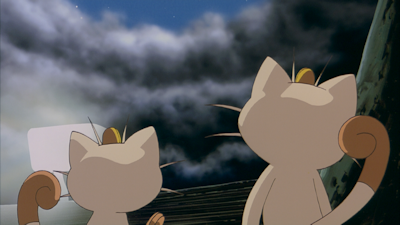
| Japanese
(original) |
Japanese
(translated) |
English
Dub |
| ニャース 「ん? "今夜の月は丸いだろう"
って?そうだニャ。きっと満月だろうニャ」 |
Nyarth: "What's that? 'The
moon sure is round tonight'...I guess it is Nya. I think it might be
even a full moon Nya." |
Meowth: "Hmm? You're right, we do have a lot in common. The same Earth, the same air, the same sky." |
| ニャースツー 「ニャ~ニャ」 |
Nyarthtwo: "Nya~ Nya" |
Meowthtwo: "Nya~ Nya" |
| ニャース 「おミャ―こんな時にお月様のことニャんて風流で哲学してるニャ―」 |
Nyarth: "But to think you'd be
gazing up at the moon at a time like this Nya." |
Meowth: "Maybe if we started lookin' at what's the same instead of always lookin' at what's different, well, who knows?" |
| ニャースツー 「ニャ~」 |
Nyarthtwo: "Nya~" |
Meowthtwo: "Nya~" |
The "maybe if we started lookin' at what's the same..." message from the English dub is perfectly nice and all, but it's not at all what Nyarth's saying in the Japanese version. Originally the two are simply enjoying a nice moment together, staring up at the moon.
Ash reunites with his friends after his Pikachu gets slapped in the face over and over:

| Japanese
(original) |
Japanese
(translated) |
English
Dub |
| サトシ 「やめさせなきゃ」 |
Satoshi: "We've gotta stop
this." |
Ash: "We gotta stop this." |
| タケシ 「ダメだ。ミュウとミュウツーがやめない限り戦いは続く」 |
Takeshi: "We can't. This
fighting will continue so long as Mew and Mewtwo keep going." |
Brock: "But how? All Mewtwo
cares about is proving how strong those super clones are." |
Proving how strong the super clones are isn't actually all Mewtwo cares about, Brock! Originally Takeshi points out that it's stopping the fight between Mew and Mewtwo that's the key to ending this whole thing.
The others continue to look on in horror:

| Japanese
(original) |
Japanese
(translated) |
English
Dub |
| ジョーイ 「生き物は同じ種類の生き物に自分の縄張りを渡そうとはしません」 |
Joy: "Living creatures don't
tend to just hand over their territory to other members of their own
species." |
Nurse Joy: "I'd rather risk my life out in Mewtwo's storm than watch these Pokémon destroy each other." |
| カスミ 「そんな…」 |
Kasumi: "You don't mean..." |
Misty: "Me too." |
| ジョーイ 「相手を追い出すまで戦います。それが生き物です」 |
Joy: "They'll fight until they
drive the other away. That's just how living creatures are." |
Nurse Joy: "I wish there was some way to stop them. I don't know what to do!" |
Japanese Joy, displaying that knowledge of Pokémon she was brought onto the island for in the first place, tells us that the Pokémon will continue fighting until they drive the other one out of their territory. Nurse Joy in the English version, on the other hand, doesn't seem to have any idea what's going on!
After the two Charizard collapse the three young kids have their say:
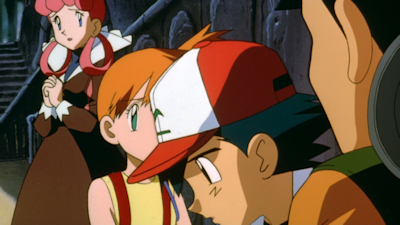
| Japanese
(original) |
Japanese
(translated) |
English
Dub |
| タケシ 「それが生き物…だけどミュウツーは人間が作った…」 |
Takeshi: "That may be how
living creatures are...but Mewtwo was made by humans..." |
Brock: "I don't think they'll ever stop. Those Pokémon look like they're ready to fight to the death." |
| カスミ 「でも今はもう生き物…」 |
Kasumi: "But it's still a
living creature, all the same." |
Misty: "That's a fight...that nobody's going to win." |
| サトシ 「今は生き物。ミュウもミュウツーも。ピカチュウも…あのピカチュウ
も」 |
Satoshi: "All the same. Both
Mew and Mewtwo. Both Pikachu...and that other Pikachu." |
Ash: "Someone's gotta take a stand. Someone's gotta say no...and refuse to fight. Just like Pikachu." |
In case it isn't super clear by this point, one of the main messages of the Japanese version of this movie is that all living creatures have a place on this planet. The English version, meanwhile, continues trying to shoehorn its "fighting is bad" moral.
I'm also amused by Misty's line in the English dub because the winner of a "fight to the death" is, rather famously, whichever one of the two who doesn't get themselves killed. It's pretty cut and dry, actually!
Music Edit
I've already gone over how all of Shinji Miyazaki's background music in this movie is replaced for the English dub, but something I've yet to really cover is how a lot of the silence in this movie is also altered.
As I mentioned before, 4Kids, to its credit, does allow some scenes to play out without any background music whatsoever. It doesn't happen as often as in the Japanese version, sure, but it's at least a lot better than what it had been doing with the TV series up until this point. Unfortunately, 4Kids adds music to one scene that crucially did not have any music; the part where Pikachu's trying to revive Satoshi.

In the original, the moment from when the lights in the stadium get blown out, and lasting all the way until Mewtwo and Mew prepare to attack, Satoshi runs in between them to stop them, Satoshi gets turned to stone, and Pikachu tries to shock him out of it...all of that plays out without any background music whatsoever. The part where Pikachu cries out over and over as it tries to shock Satoshi awake, in particular, is so silent you can even hear every breath Ikue Otani takes in as she cries out "Pikapi." The background music only starts up again once Pikachu starts shedding tears for its Trainer.
For the English dub, however, there's music droning on throughout most of this. First a rather triumphant sounding piece of music plays, for some reason, when Mewtwo and Mew are blasting each other, then a somewhat more appropriate somber piece plays as we pan over the various Pokémon in pain, then another triumphant sound piece as Ash is running to stop the fight, then a somber piece again. There's a few seconds of silence as Pikachu tries to shock Ash awake but then this sort of high pitched ambient chime is added to the scenes of Pikachu shocking Ash. 4Kids never lets the scene get "too" quiet; there's always some sort of noise going on in the background.
I know I've talked about this in my regular episode comparisons before, but scenes like this where background music is added in by the English dub to fill in any "gaps" of silence are just as disruptive to a production's sound profile as replacing one piece of music with another. In the Japanese version this scene stands out because it's so much more quiet than everything else up until this point that it practically forces you to hold your breath to see what's going to happen to Satoshi.. But in the English dub? In the 4Kids version this is just another scene, no different from any other.
Dialogue Edit
The next two rewrites I'll need to as a set since the dub annoyingly shuffles some dialogue around. First, after Ash is revived:

| Japanese
(original) |
Japanese
(translated) |
English
Dub |
| ミュウツー 「確かにお前も私も既に存在しているポケモン同士だ」 |
Mewtwo: "I see now that both
you and I are Pokémon who already exist in this world." |
Mewtwo: "The human sacrificed
himself to save the Pokémon. I pitted them against each other,
but not until they set aside their differences did I see the true power
they all shared deep inside." |
| ミュウ 「ミュウ」 |
Mew: "Mew." |
Mew: "Mew" |
| ミュウツー 「この出来事は誰も知らないほうがいいのかもしれない。忘れたほう
が…いいのかもしれない」 |
Mewtwo: "Perhaps it would be
better if nobody were to know about what happened today. Perhaps it
would be better...for them to forget." |
Mewtwo: "I see now that the
circumstances of one's birth are irrelevant. It is what you do with the
gift of life that determines who you are." |
After this, Mewtwo uses its psychic powers to start getting all its clones ready to leave the island:

| Japanese
(original) |
Japanese
(translated) |
English
Dub |
| サトシ 「みんな、どこへ行くの?」 |
Satoshi: "Where are you all
going?" |
Ash: "Mewtwo, where are you
going?" |
| ミュウツー 「我々は生まれた…生きている…生き続ける。この世界の…どこか
で」 |
Mewtwo: "We were born into
this world...we live...and we'll continue to live. We'll continue to
live in this world...somewhere...." |
Mewtwo:
"Where my heart can learn what yours knows so well. What transpired
here, I will always remember. But perhaps for you, these events are
best forgotten." |
Alright, where to begin? Originally, Mewtwo's line about making sure everyone forgets what happened on that island is said right after Satoshi is revived, and then as it's flying off it talks about its hopes for the future. In the English dub, however, Mewtwo's line about making everyone forget is moved to the end here, with the original dialogue being replaced by that "circumstances of one's birth" line. My only guess as to why 4Kids would rearrange the dialogue like this is to have Mewtwo's "make everyone forget" line occur a little closer to the point in the movie where it actually makes them forget than it did in the original.
And then there's the "circumstances of one's birth" line. OK look, I get that this is arguably one of the most popular and most quoted lines in all of English dubbed anime, period. It's iconic, it's beloved, it's incredibly well known. But it's also not at all the lesson Mewtwo takes from this movie in the original.
Takeshi Shudo's script has Mewtwo realize that Originals and Copies are both living beings and therefore have a right to co-exist in the same world, point blank period. The original version doesn't dip its toes into any conversation about what you actually do with that gift of life, it just states that anyone who's brought into this world deserves to take up space on this planet. Is Mew alive? Yes, therefore it has a right to exist. Is Mewtwo alive? Also yes, and therefore it also has a right to exist. There's no merit based judgment going on here, just a basic "let living things live."
Haigney's and Grossfeld's script, on the other hand, turns the focus away from an individual's right to life to focus more on the legacy left behind. Do good things, you're a good person; do bad things, you're a bad person. Don't get hung up on the circumstances of your birth because those aren't going to be what determines who you will become, it's what you do afterwards that's important.
Which is fine, in and of itself, though in the context of this movie it's also a bit effed up. If the lesson Mewtwo's supposed to take away from this whole experience is that "It is what you do with the gift of life that determines who you are," then what conclusions are we supposed to make about this movie's titular character? Mewtwo killed its parents. It lured a bunch of children to its island where it proceeded to taunt, threaten, and assault them. It stole the Pokémon its captors brought with them, with zero intention of ever giving them back, and then went against God to create an army of unholy clones. And, in the English dub, it also had plans to create a massive storm to kill literally everyone else on the planet. So I don't know, it seems like the full quote should be something along the lines of "I see now that the circumstances of one's birth are irrelevant. It is what you do with the gift of life that determines who you are...which, based on everything I've been doing this last hour or so, means I am a complete and utter monster. Oh well. Bye bye!"
Back at the wharf:

| Japanese
(original) |
Japanese
(translated) |
English
Dub |
| (no
dialogue) |
(no dialogue) | Trainer: "...me too." |
| (no dialogue) | (no dialogue) | Trainer: "Ya think they have enough pizza down there?" |
| (no dialogue) | (no dialogue) | Trainer: "My Raichu's hungry,
I'm getting him something to eat." |
There's no dialogue here in the Japanese version.
Brock checks out the ladies:
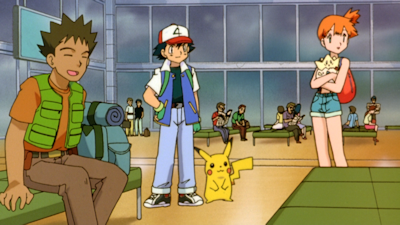
| Japanese
(original) |
Japanese
(translated) |
English
Dub |
| タケシ 「ジョーイさん、ジュンサーさん、ボイジャーさん。みんな今日は雨にぬ
れてことのほかきれい」 |
Takeshi: "Joy-san, Junsar-san,
Voyager-san...they're so pretty with their skin glistening from the
rain." |
Brock: "Nurse Joy and Officer Jenny are really great! They just keep getting more beautiful every time I see 'em." |
The Japanese line here is actually pretty creepy so I don't blame 4Kids for changing it. Takeshi also says that Voyager is beautiful, but I guess 4Kids thought Miranda was too old for Brock to be hitting on or something and decided to change it.
Everyone looks outside:
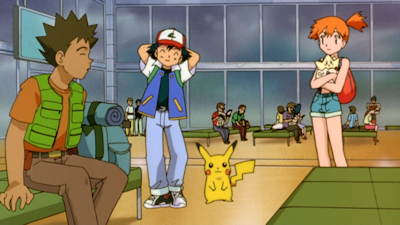
| Japanese
(original) |
Japanese
(translated) |
English
Dub |
| (no
dialogue) |
(no
dialogue) |
Officer Jenny: "Look! It's a
miracle!" |
| サトシ 「あれ?」 | Satoshi: "Huh?" |
Ash: "Huh?" |
| タケシとカスミ 「ん?」 | Takeshi and Kasumi: "Huh?" |
Brock and Misty: "Huh?" |
Originally Satoshi and his friends just happen to look outside to notice the rainbow, but I suppose 4Kids thought that was a bit too "confusing" and so they added Officer Jenny shouting from off-screen to prompt everyone to turn their heads.
The narrator closes out the movie:

| Japanese
(original) |
Japanese
(translated) |
English
Dub |
| ナレーション 「ポケットモンスター…これはポケモンマスターを目指すみんなと
不思議な生き物『ポケモン』との出会いのお話である。そしてその旅はまだまだ続く」 |
Narrator: "Pocket
Monsters...this is the story of the encounters between those who aspire
to become Pokémon Masters and the mysterious creatures known as
"Pokémon." There are still lots more adventures ahead on their
journey." |
Narrator: "Many strange
legends surround the mysteries of Pokémon. And just as many
adventures await our young heroes as they continue on their quest. For
Ash and his friends, the journey's just begun." |
These two are super different as the Japanese version provides a much more general overview of the concept of "Pokémon" itself than the English dub does.
The Rocket trio get the honor of being the last rewrites of the film:

| Japanese
(original) |
Japanese
(translated) |
English
Dub |
| ムサシ 「だけどこれだけなーんもないと」 |
Musashi: "But there's not a
thing out here." |
Jessie: "I don't have a clue
how we got here, but who cares?" |
| コジロウ 「きれいさっぱり」 |
Kojirou: "It's so clean and
refreshing." |
James: "This is paradise." |
| ニャース 「いつもと違って」 |
Nyarth: "It's so different
from usual." |
Meowth: "For once, a happy
ending." |
| ロケット団 「いい感じいいい!」 |
Rocket-Dan: "What a great
feeeeeeling!" |
Team Rocket: "Team Rocket's
signing off again!" |
| James: "Do you have any sunscreen?" | ||
| ニャース 「ニャ!」 | Nyarth: "Nya!" | Meowth: "Y'know I'd really like to go sailing in one of them catamarans! Haha!" |
4Kids decides to end the biggest movie it'll ever work on...with a cat/catamaran pun? Um...sure...? It's kind of a wild line with which to end its version of the film, but I guess making baffling choices like this is also kind of a perfect topper to this whole experience so I guess it's weirdly appropriate.
Music Edit
The movie's ending theme, Kaze to Issho ni, is an amazingly beautiful piece of music that ranks among the best this franchise has ever produced. So, of course, 4Kids replaced it.
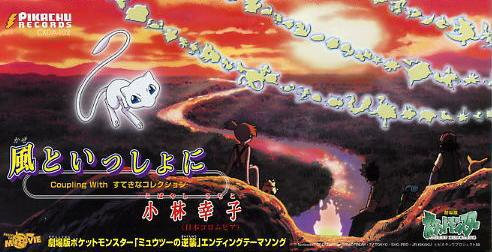
They didn't just replace it with one song, either. Four songs, each of them playing for about 30 seconds before being interrupted by the next song in line, play throughout the two minute ending sequence. Those songs, for those of you keeping track, are We're a Miracle by Christina Aguilera, (Hey You) Free Up Your Mind by Emma Bunton, If Only Tears Could Bring You Back by Midnight Sons, and Don't Say You Love Me by M2M. And don't feel bad if the only name you recognize in that list is Christina Aguilera; none of us knew who in the world groups like M2M were back in 1999, either.
It's tempting to rag on the English dub for using stupid pop songs for the movie's ending theme but that wouldn't really be fair since they pull that same nonsense in Japan as well. Is M2M's Don't Say You Love Me really any less appropriate than, say, Crystal Kay's One from the Giratina movie? It's a hard argument to make.
Of course, I would have preferred they either keep Kaze to Issho ni as-is or at least had an English translation of the song play in its place. But if 4Kids absolutely had to replace Kaze to Issho ni, then I think playing the entire Christina Aguilera song and only the Christina Aguilera song would have been the best way to go. I'm not a fan of the very American style of "let's cram as many songs into the end credits as possible," and of the four songs they played I think We're a Miracle comes the closest to capturing the feeling that Kaze to Issho ni feel.
And that brings Pokémon The First Movie to a close. It's been more than twenty-five years since the movie came out and there are people out there who have still only seen it in English, and that's a real shame because the Japanese version is quite an experience. As far as I'm concerned the Japanese version and the English version of this movie are two very different films, and so I humbly urge any of you who have not seen the former yet to do so as soon as possible. I don't think you'll be disappointed.
| Return to episode comparisons |
This page was last updated on December 20th, 2024
Found an error or omission? Please help me keep this page current and error-free by e-mailing me with a description of the issue.


